Family At War Quotes & Sayings
Enjoy reading and share 78 famous quotes about Family At War with everyone.
Top Family At War Quotes
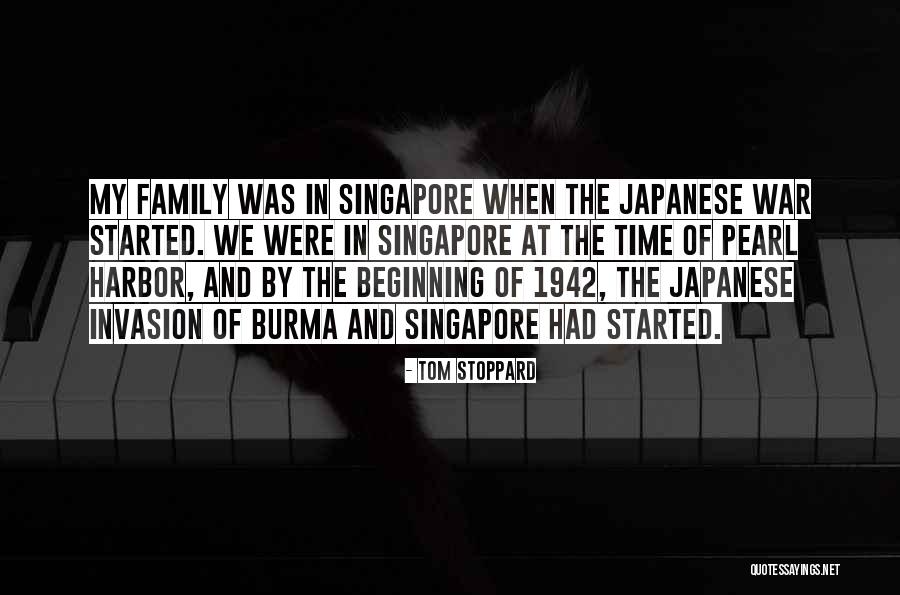
My family was in Singapore when the Japanese War started. We were in Singapore at the time of Pearl Harbor, and by the beginning of 1942, the Japanese invasion of Burma and Singapore had started. — Tom Stoppard
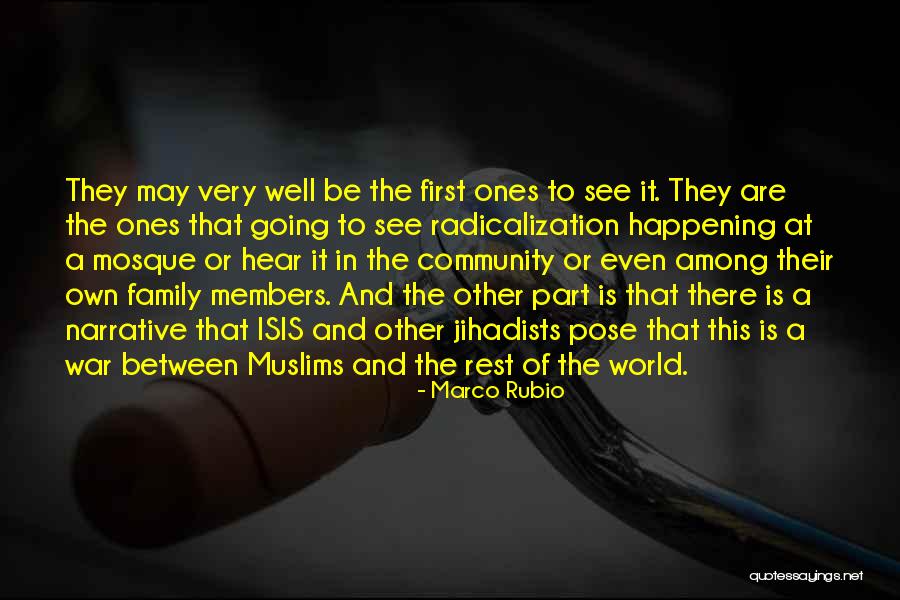
They may very well be the first ones to see it. They are the ones that going to see radicalization happening at a mosque or hear it in the community or even among their own family members. And the other part is that there is a narrative that ISIS and other jihadists pose that this is a war between Muslims and the rest of the world. — Marco Rubio
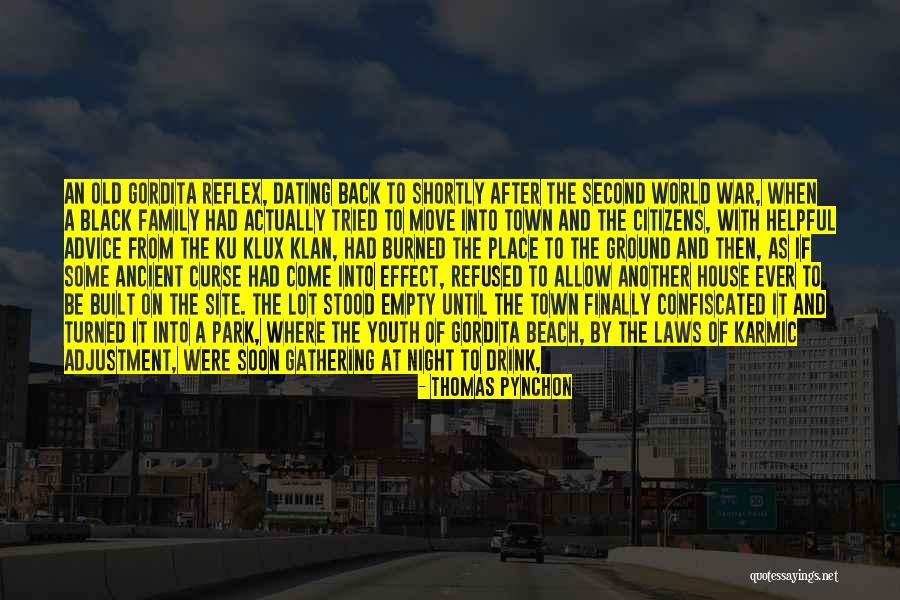
An old Gordita reflex, dating back to shortly after the Second World War, when a black family had actually tried to move into town and the citizens, with helpful advice from the Ku Klux Klan, had burned the place to the ground and then, as if some ancient curse had come into effect, refused to allow another house ever to be built on the site. The lot stood empty until the town finally confiscated it and turned it into a park, where the youth of Gordita Beach, by the laws of karmic adjustment, were soon gathering at night to drink, dope, and fuck, depressing their parents, though not property values particularly. — Thomas Pynchon
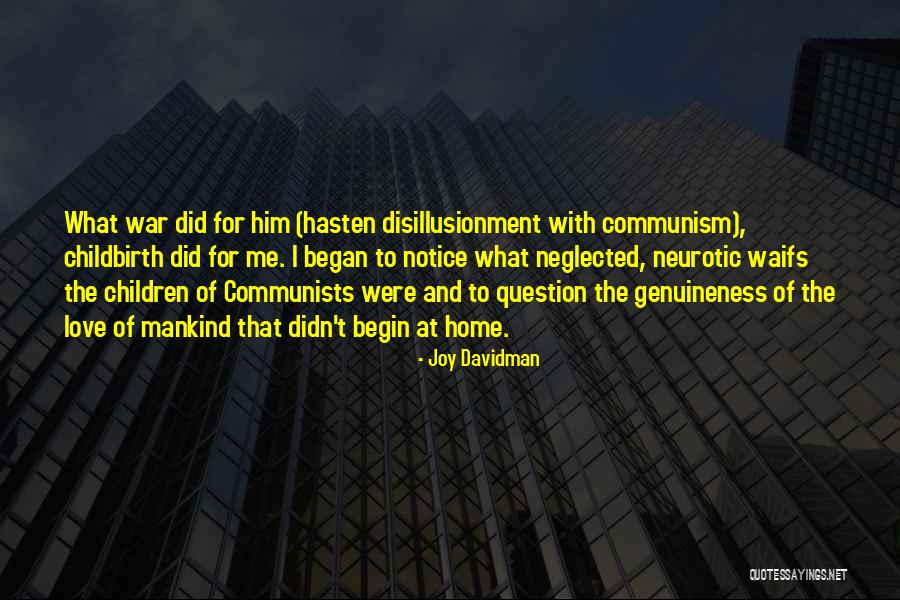
What war did for him (hasten disillusionment with communism), childbirth did for me. I began to notice what neglected, neurotic waifs the children of Communists were and to question the genuineness of the love of mankind that didn't begin at home. — Joy Davidman
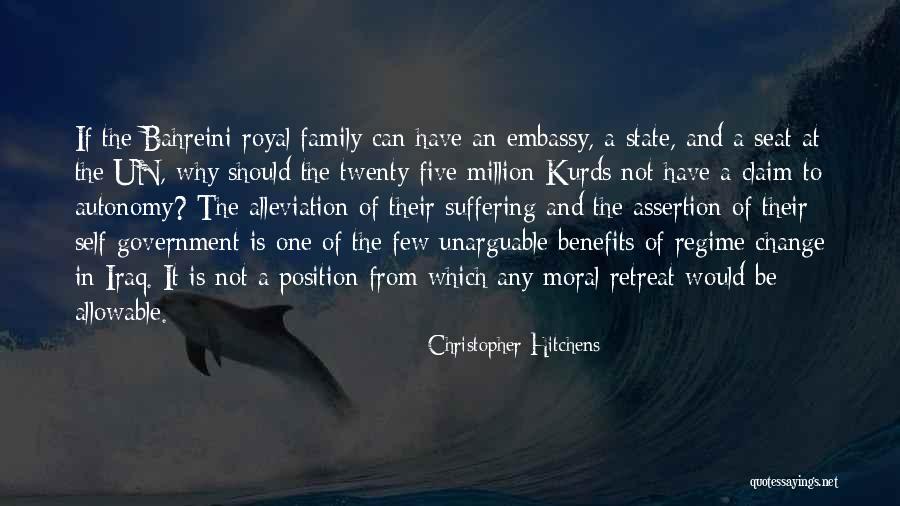
If the Bahreini royal family can have an embassy, a state, and a seat at the UN, why should the twenty-five million Kurds not have a claim to autonomy? The alleviation of their suffering and the assertion of their self-government is one of the few unarguable benefits of regime change in Iraq. It is not a position from which any moral retreat would be allowable. — Christopher Hitchens
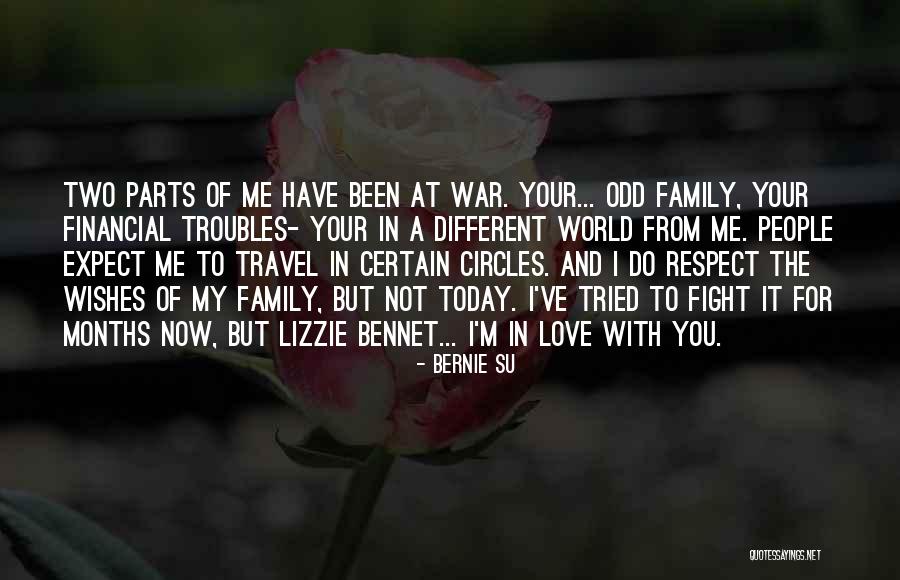
Two parts of me have been at war. Your... odd family, your financial troubles- your in a different world from me. people expect me to travel in certain circles. And I do respect the wishes of my family, but not today. I've tried to fight it for months now, but Lizzie Bennet... I'm in love with you. — Bernie Su
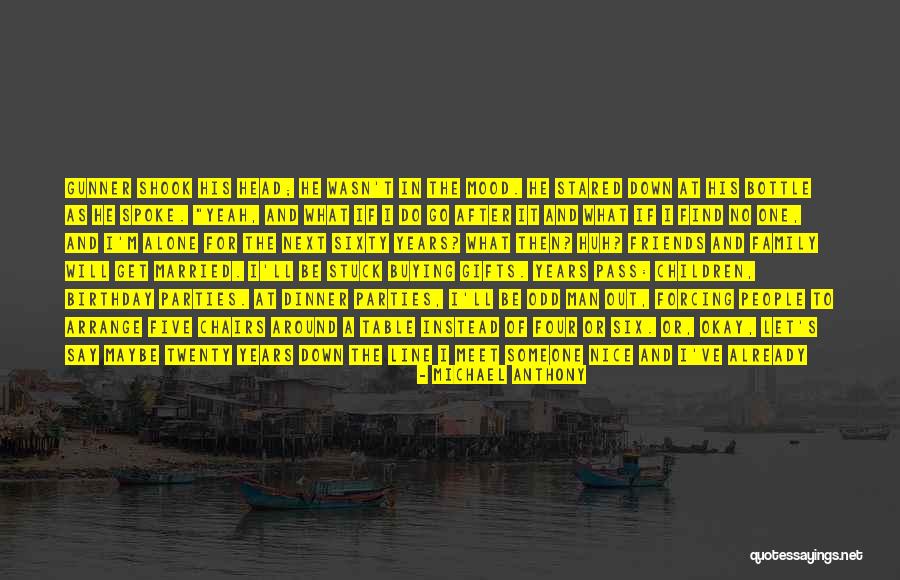
Gunner shook his head; he wasn't in the mood. He stared down at his bottle as he spoke. "Yeah, and what if I do go after it and what if I find no one, and I'm alone for the next sixty years? What then? Huh? Friends and family will get married. I'll be stuck buying gifts. Years pass: children, birthday parties. At dinner parties, I'll be odd man out, forcing people to arrange five chairs around a table instead of four or six. Or, okay, let's say maybe twenty years down the line I meet someone nice and I've already given up on ever finding true love. Let's say the girl is a few pounds overweight, has fizzy hair and an annoying laugh, but at this point, I'm also a few pounds overweight and my hair is thinning and my laughter is annoying. Maybe then the two of us get married, and both our groups of friends will say, 'See I told you that you'd find true love. It just took a while.' And we'll smile, but we'll both know it's a lie-- — Michael Anthony
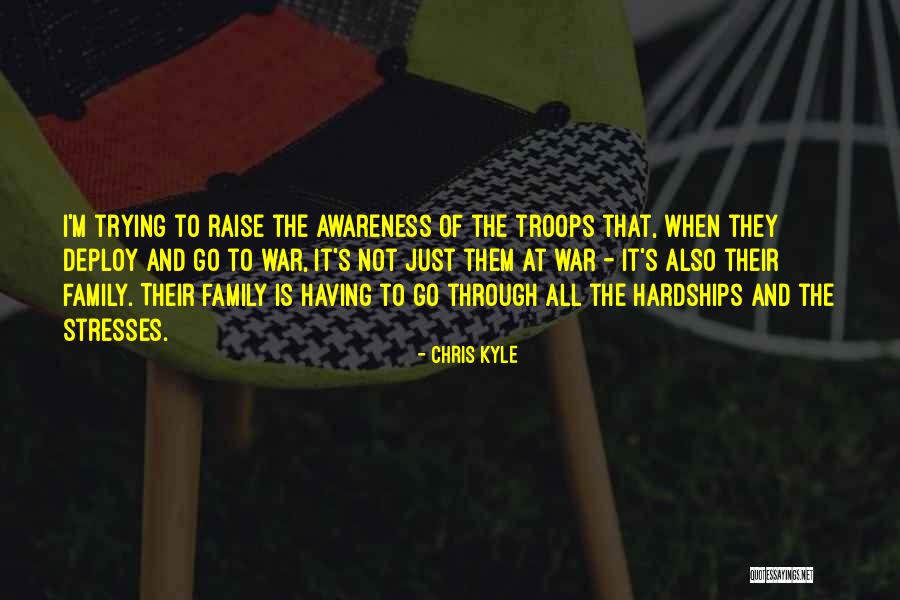
I'm trying to raise the awareness of the troops that, when they deploy and go to war, it's not just them at war - it's also their family. Their family is having to go through all the hardships and the stresses. — Chris Kyle
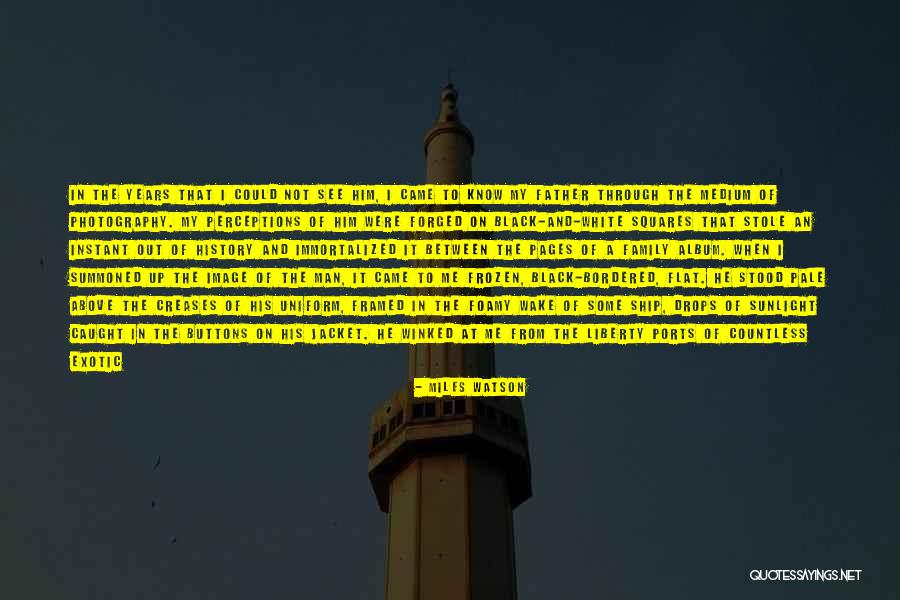
In the years that I could not see him, I came to know my father through the medium of photography. My perceptions of him were forged on black-and-white squares that stole an instant out of history and immortalized it between the pages of a family album. When I summoned up the image of the man, it came to me frozen, black-bordered, flat. He stood pale above the creases of his uniform, framed in the foamy wake of some ship, drops of sunlight caught in the buttons on his jacket. He winked at me from the liberty ports of countless exotic places. In an atrocious hand he scrawled stilted, affectionate words to the stranger that bore his name and his features, telling of adventures far away, misbehavings under suns hotter than that which shone over the Greater German Reich. — Miles Watson
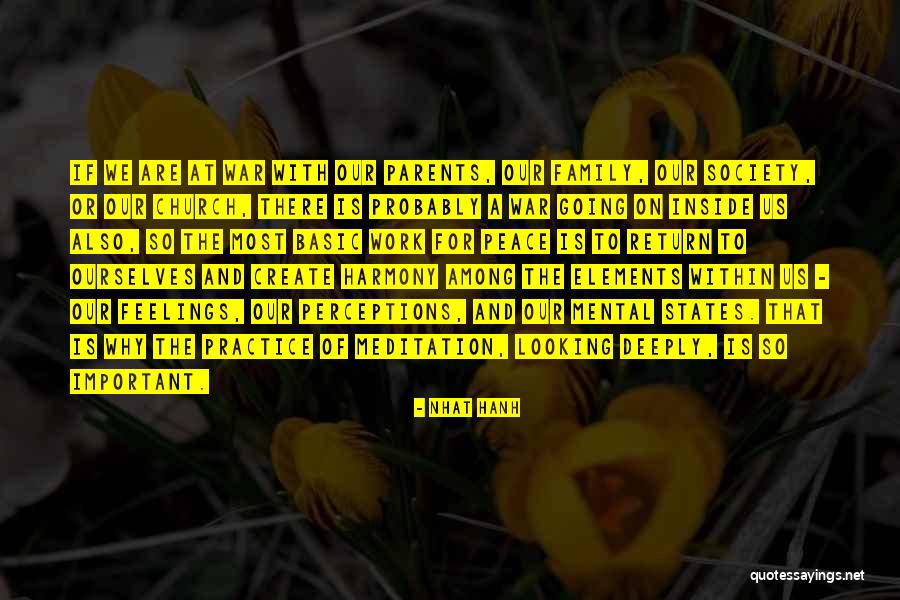
If we are at war with our parents, our family, our society, or our church, there is probably a war going on inside us also, so the most basic work for peace is to return to ourselves and create harmony among the elements within us - our feelings, our perceptions, and our mental states. That is why the practice of meditation, looking deeply, is so important. — Nhat Hanh
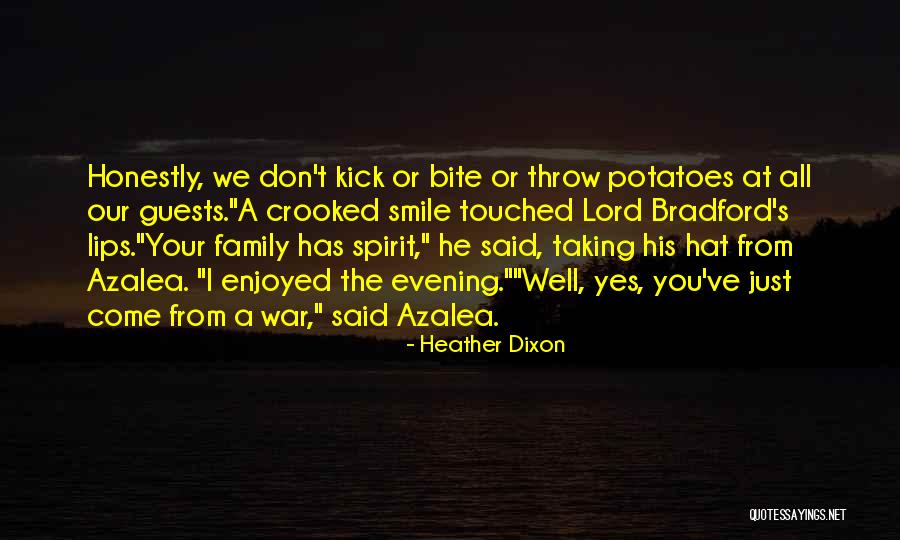
Honestly, we don't kick or bite or throw potatoes at all our guests."
A crooked smile touched Lord Bradford's lips.
"Your family has spirit," he said, taking his hat from Azalea. "I enjoyed the evening."
"Well, yes, you've just come from a war," said Azalea. — Heather Dixon
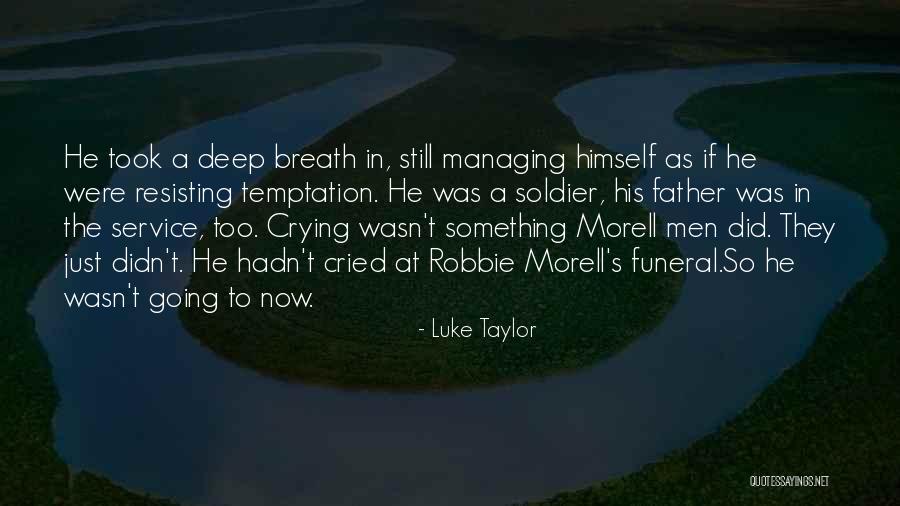
He took a deep breath in, still managing himself as if he were resisting temptation. He was a soldier, his father was in the service, too. Crying wasn't something Morell men did. They just didn't.
He hadn't cried at Robbie Morell's funeral.
So he wasn't going to now. — Luke Taylor
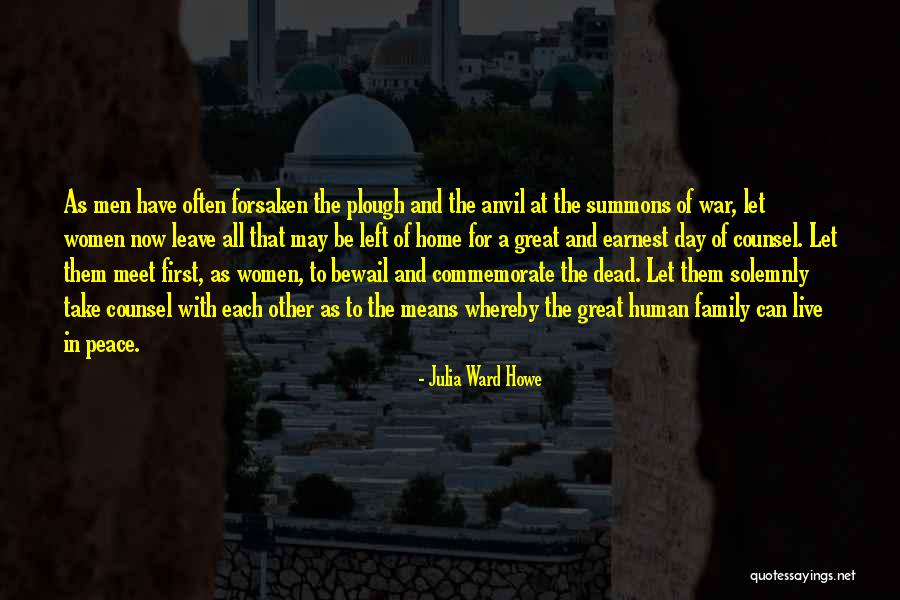
As men have often forsaken the plough and the anvil at the summons of war, let women now leave all that may be left of home for a great and earnest day of counsel. Let them meet first, as women, to bewail and commemorate the dead. Let them solemnly take counsel with each other as to the means whereby the great human family can live in peace. — Julia Ward Howe
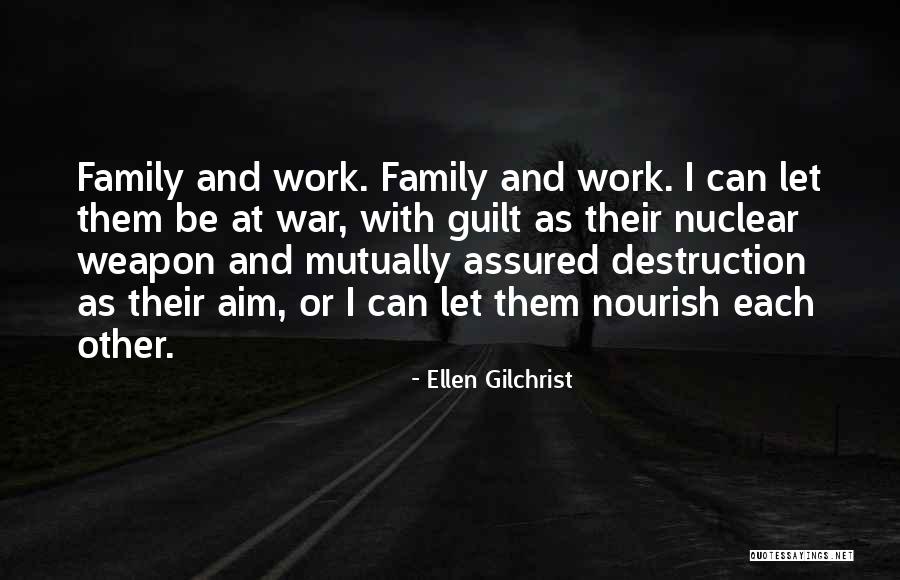
Family and work. Family and work. I can let them be at war, with guilt as their nuclear weapon and mutually assured destruction as their aim, or I can let them nourish each other. — Ellen Gilchrist
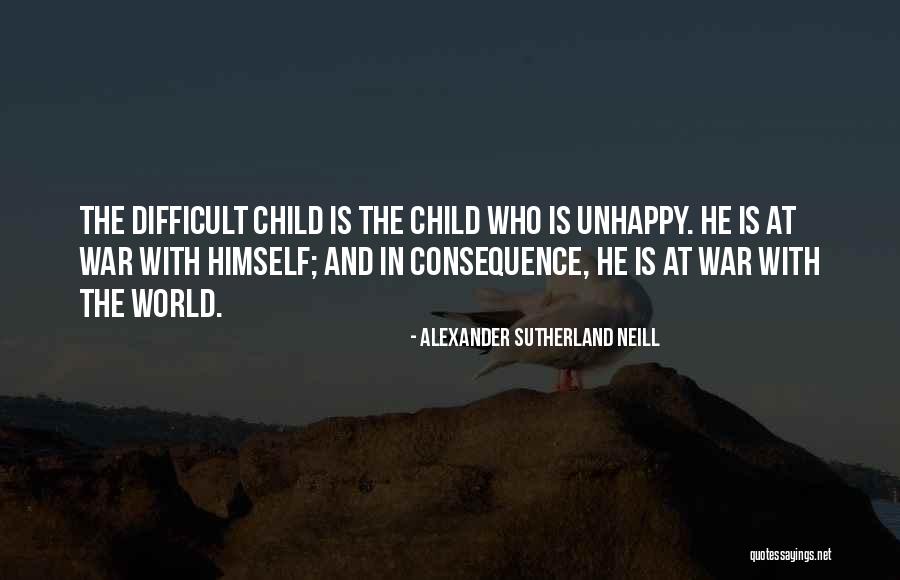
The difficult child is the child who is unhappy. He is at war with himself; and in consequence, he is at war with the world. — Alexander Sutherland Neill
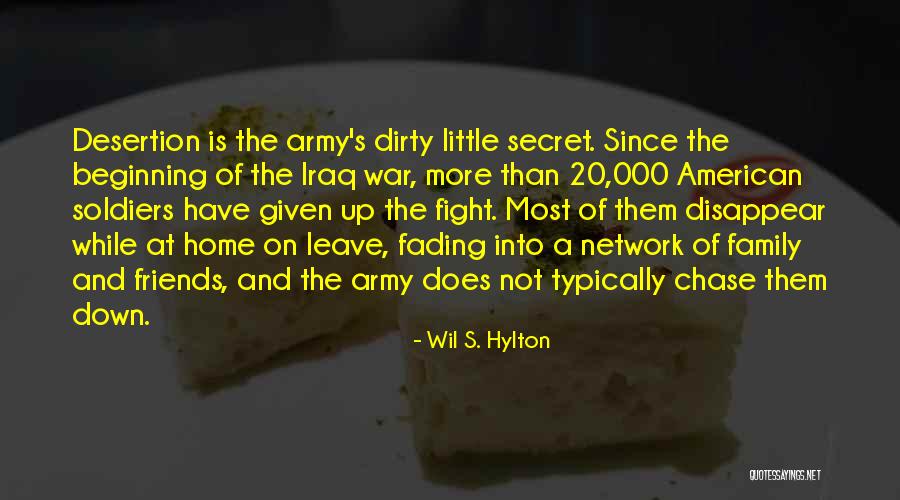
Desertion is the army's dirty little secret. Since the beginning of the Iraq war, more than 20,000 American soldiers have given up the fight. Most of them disappear while at home on leave, fading into a network of family and friends, and the army does not typically chase them down. — Wil S. Hylton
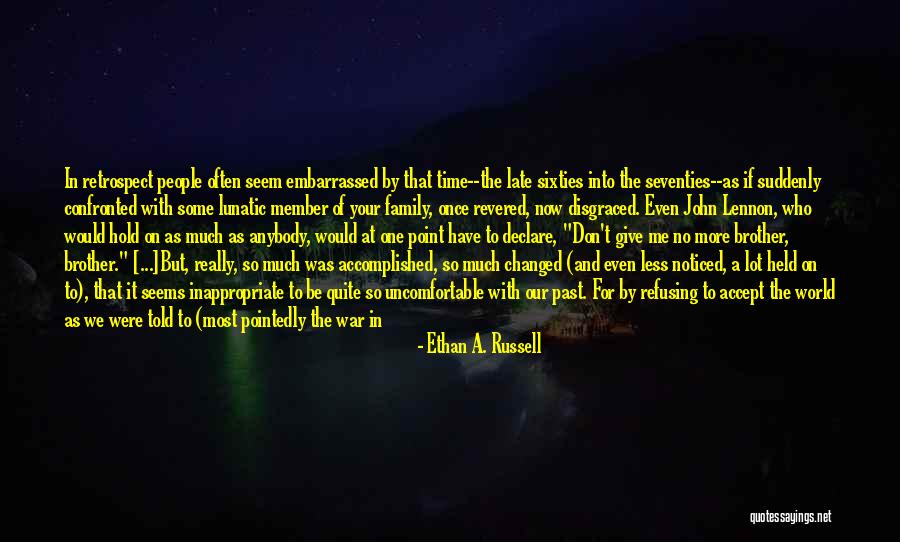
In retrospect people often seem embarrassed by that time--the late sixties into the seventies--as if suddenly confronted with some lunatic member of your family, once revered, now disgraced. Even John Lennon, who would hold on as much as anybody, would at one point have to declare, "Don't give me no more brother, brother." [...]
But, really, so much was accomplished, so much changed (and even less noticed, a lot held on to), that it seems inappropriate to be quite so uncomfortable with our past. For by refusing to accept the world as we were told to (most pointedly the war in Vietnam) we held on to many of the traditional values we had been taught, not the least of which was to demand accountability from our government. We shouldn't forget that a lot had to change. For America couldn't forever remain the child of the Hula-Hoop with the arsenal of Armageddon. — Ethan A. Russell
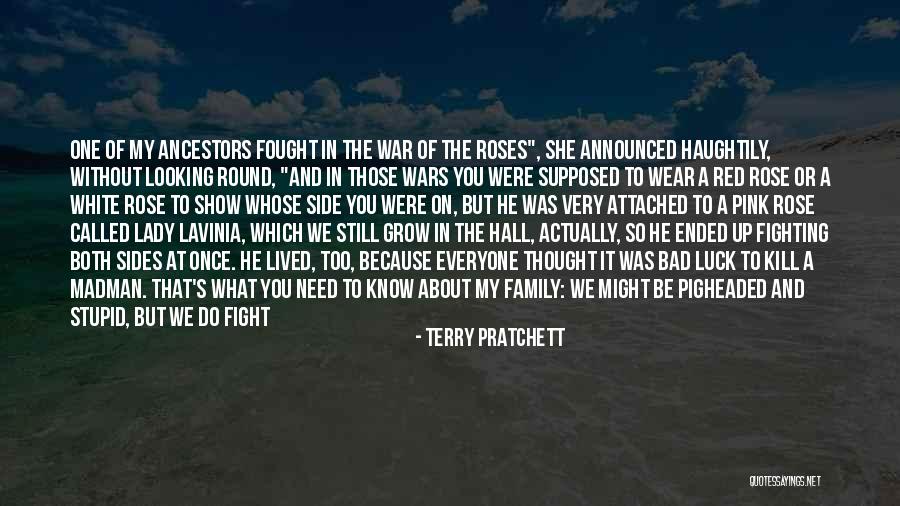
One of my ancestors fought in the War of the Roses", she announced haughtily, without looking round, "and in those wars you were supposed to wear a red rose or a white rose to show whose side you were on, but he was very attached to a pink rose called Lady Lavinia, which we still grow in the Hall, actually, so he ended up fighting both sides at once. He lived, too, because everyone thought it was bad luck to kill a madman. That's what you need to know about my family: We might be pigheaded and stupid, but we do fight — Terry Pratchett
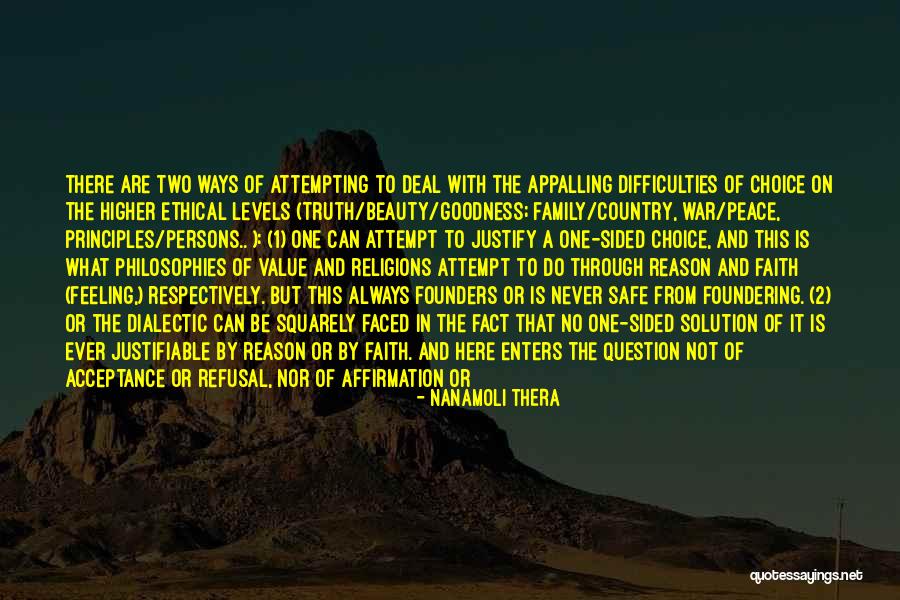
There are two ways of attempting to deal with the appalling difficulties of choice on the higher ethical levels (Truth/beauty/goodness; family/country, war/peace, principles/persons.. ): (1) one can attempt to justify a one-sided choice, and this is what philosophies of value and religions attempt to do through reason and faith (feeling,) respectively. But this always founders or is never safe from foundering. (2) Or the dialectic can be squarely faced in the fact that no one-sided solution of it is ever justifiable by reason or by faith. And here enters the question not of acceptance or refusal, nor of affirmation or denial, but of letting-go. The letting-go, however, is limited, in life at least (and without taking death into account) by the boundary of ability to let go. — Nanamoli Thera
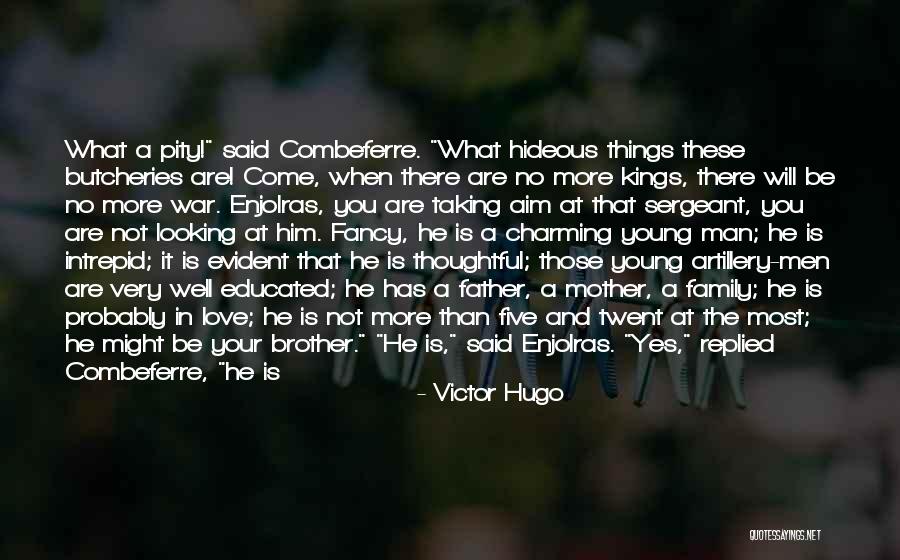
What a pity!" said Combeferre. "What hideous things these butcheries are! Come, when there are no more kings, there will be no more war. Enjolras, you are taking aim at that sergeant, you are not looking at him. Fancy, he is a charming young man; he is intrepid; it is evident that he is thoughtful; those young artillery-men are very well educated; he has a father, a mother, a family; he is probably in love; he is not more than five and twent at the most; he might be your brother." "He is," said Enjolras. "Yes," replied Combeferre, "he is mine too. Well, let us not kill him." "Let me alone, it must be done." And a tear trickled slowly down Enjolras' marble cheek. — Victor Hugo
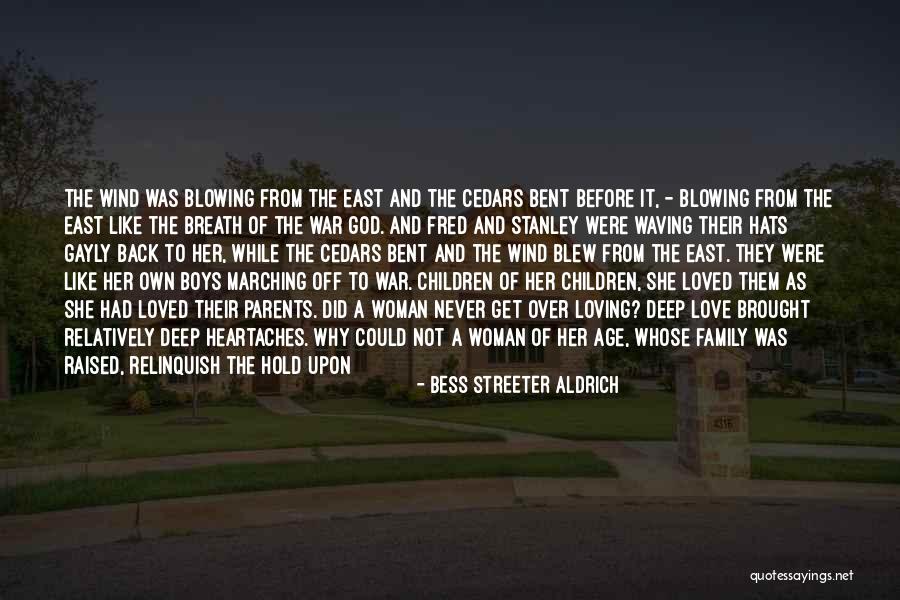
The wind was blowing from the east and the cedars bent before it, - blowing from the east like the breath of the war god. And Fred and Stanley were waving their hats gayly back to her, while the cedars bent and the wind blew from the east. They were like her own boys marching off to war. Children of her children, she loved them as she had loved their parents. Did a woman never get over loving? Deep love brought relatively deep heartaches. Why could not a woman of her age, whose family was raised, relinquish the hold upon her emotions? Why could she not have a peaceful old age, wherein there entered neither great affection nor its comrade, great sorrow? She had seen old women who seemed not to care as she was caring, whose emotions seemed to have died with their youth. Could she not be one of them? For a long time she stood in the window and looked at the cedars twisting before the east wind, like so many helpless women under the call from the east. — Bess Streeter Aldrich
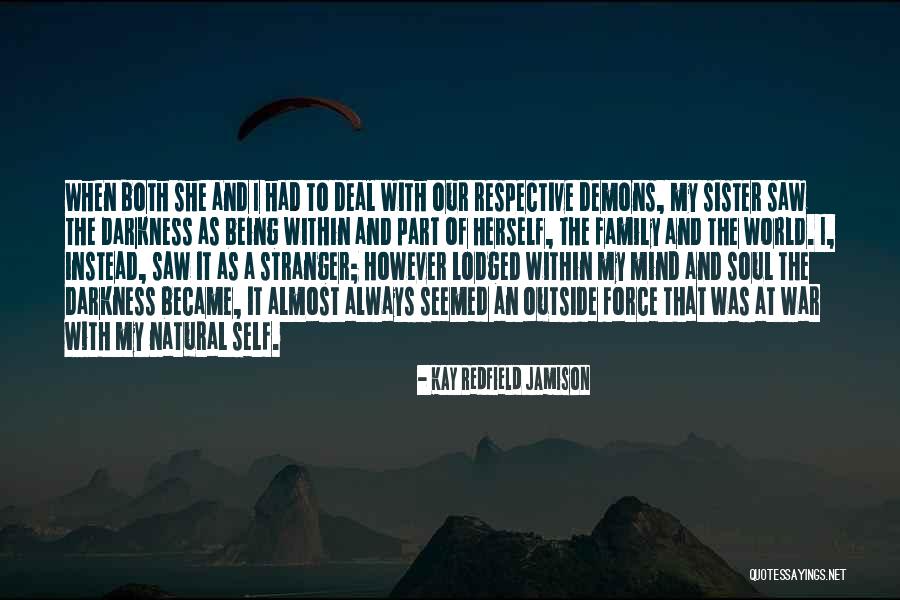
When both she and I had to deal with our respective demons, my sister saw the darkness as being within and part of herself, the family and the world. I, instead, saw it as a stranger; however lodged within my mind and soul the darkness became, it almost always seemed an outside force that was at war with my natural self. — Kay Redfield Jamison
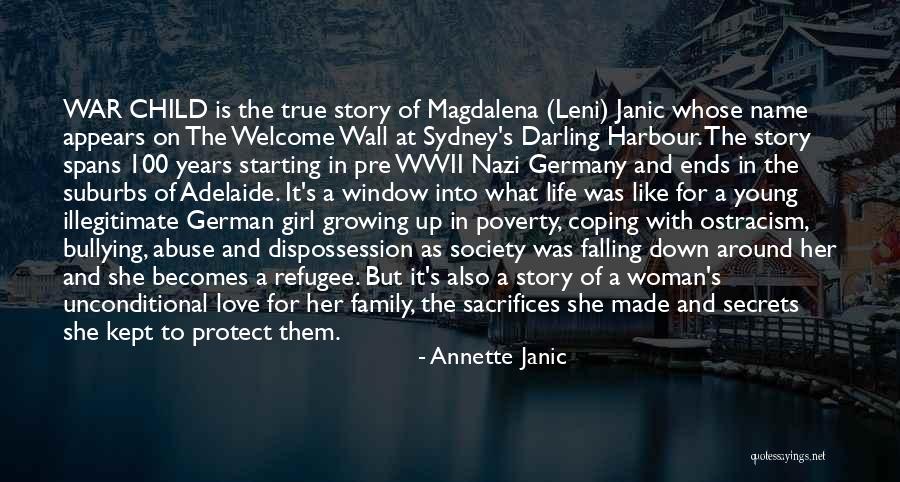
WAR CHILD is the true story of Magdalena (Leni) Janic whose name appears on The Welcome Wall at Sydney's Darling Harbour. The story spans 100 years starting in pre WWII Nazi Germany and ends in the suburbs of Adelaide. It's a window into what life was like for a young illegitimate German girl growing up in poverty, coping with ostracism, bullying, abuse and dispossession as society was falling down around her and she becomes a refugee. But it's also a story of a woman's unconditional love for her family, the sacrifices she made and secrets she kept to protect them. Her ultimate secret was only revealed in a bizarre twist after her death and much to her daughter's (and author) surprise involved her. A memorable tear-jerker! A sad cruel story told with so much love. — Annette Janic
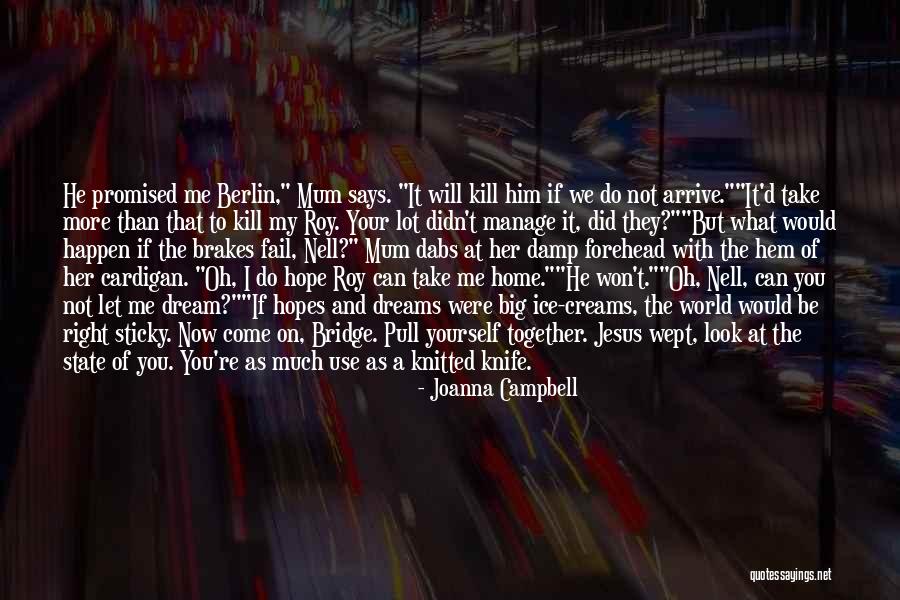
He promised me Berlin," Mum says. "It will kill him if we do not arrive."
"It'd take more than that to kill my Roy. Your lot didn't manage it, did they?"
"But what would happen if the brakes fail, Nell?" Mum dabs at her damp forehead with the hem of her cardigan. "Oh, I do hope Roy can take me home."
"He won't."
"Oh, Nell, can you not let me dream?"
"If hopes and dreams were big ice-creams, the world would be right sticky. Now come on, Bridge. Pull yourself together. Jesus wept, look at the state of you. You're as much use as a knitted knife. — Joanna Campbell
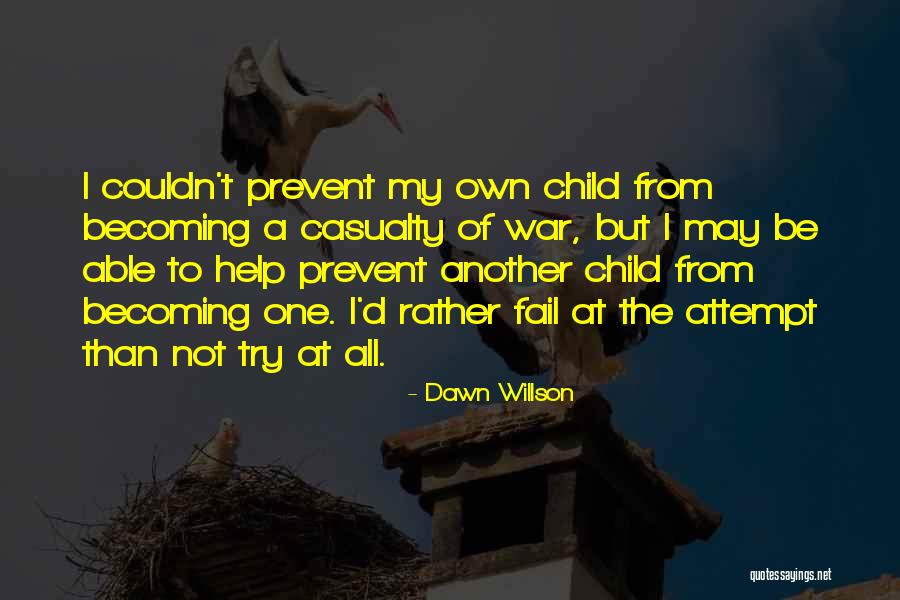
I couldn't prevent my own child from becoming a casualty of war, but I may be able to help prevent another child from becoming one. I'd rather fail at the attempt than not try at all. — Dawn Willson
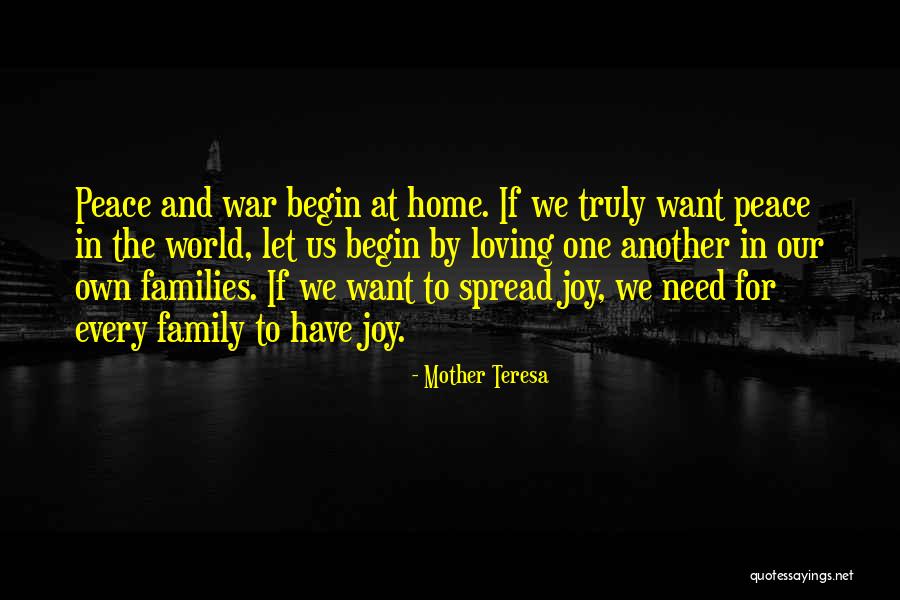
Peace and war begin at home. If we truly want peace in the world, let us begin by loving one another in our own families. If we want to spread joy, we need for every family to have joy. — Mother Teresa
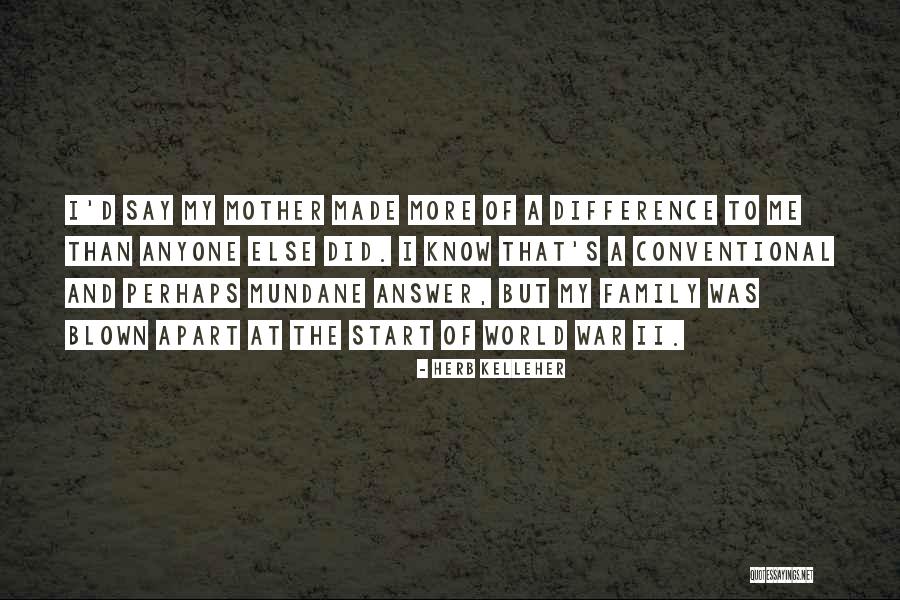
I'd say my mother made more of a difference to me than anyone else did. I know that's a conventional and perhaps mundane answer, but my family was blown apart at the start of World War II. — Herb Kelleher
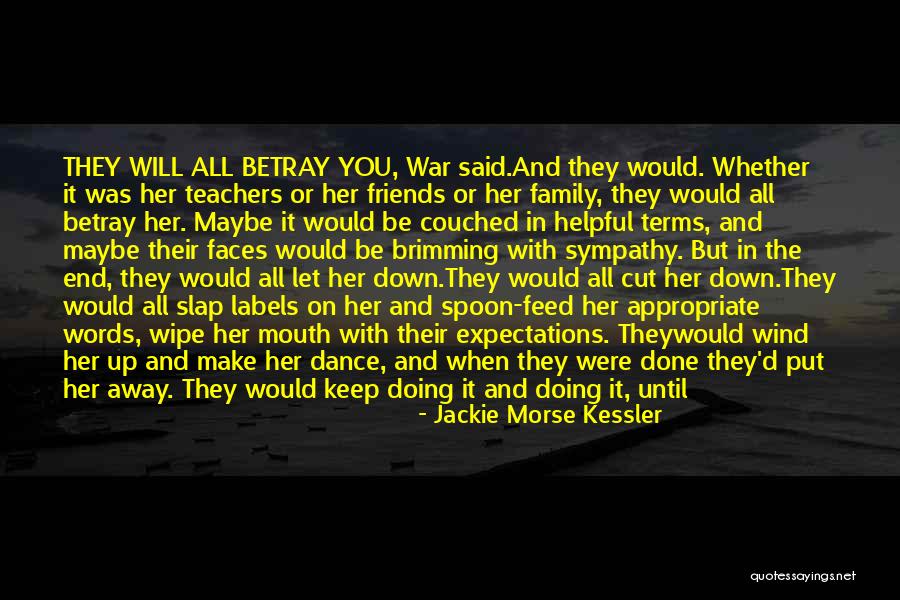
THEY WILL ALL BETRAY YOU, War said.
And they would. Whether it was her teachers or her friends or her family, they would all betray her. Maybe it would be couched in helpful terms, and maybe their faces would be brimming with sympathy. But in the end, they would all let her down.
They would all cut her down.
They would all slap labels on her and spoon-feed her appropriate words, wipe her mouth with their expectations. They
would wind her up and make her dance, and when they were done they'd put her away. They would keep doing it and doing it, until she was nothing more than a shell, a skin, something to slip on and slip off and tuck in at the corners.
They would ... unless she stopped them. — Jackie Morse Kessler
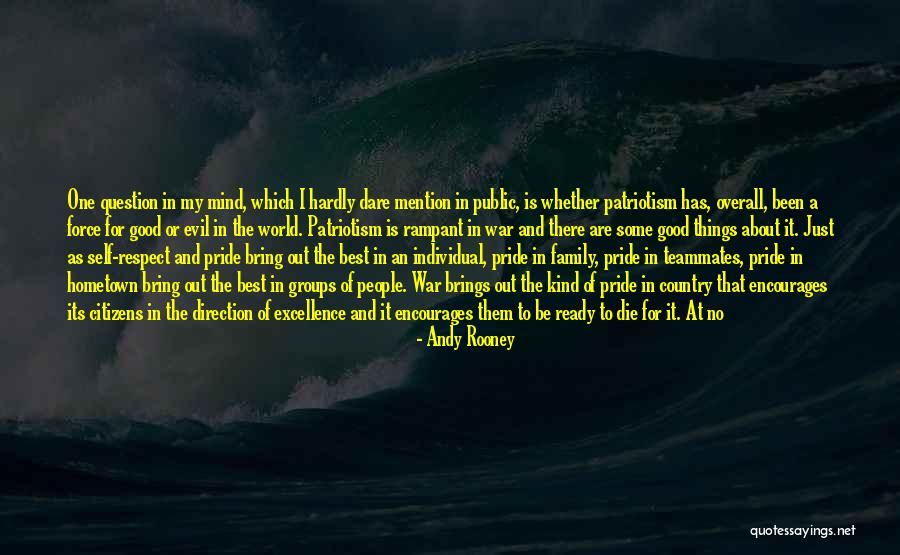
One question in my mind, which I hardly dare mention in public, is whether patriotism has, overall, been a force for good or evil in the world. Patriotism is rampant in war and there are some good things about it. Just as self-respect and pride bring out the best in an individual, pride in family, pride in teammates, pride in hometown bring out the best in groups of people. War brings out the kind of pride in country that encourages its citizens in the direction of excellence and it encourages them to be ready to die for it. At no time do people work so well together to achieve the same goal as they do in wartime. Maybe that's enough to make patriotism eligible to be considered a virtue. If only I could get out of my mind the most patriotic people who ever lived, the Nazi Germans. — Andy Rooney
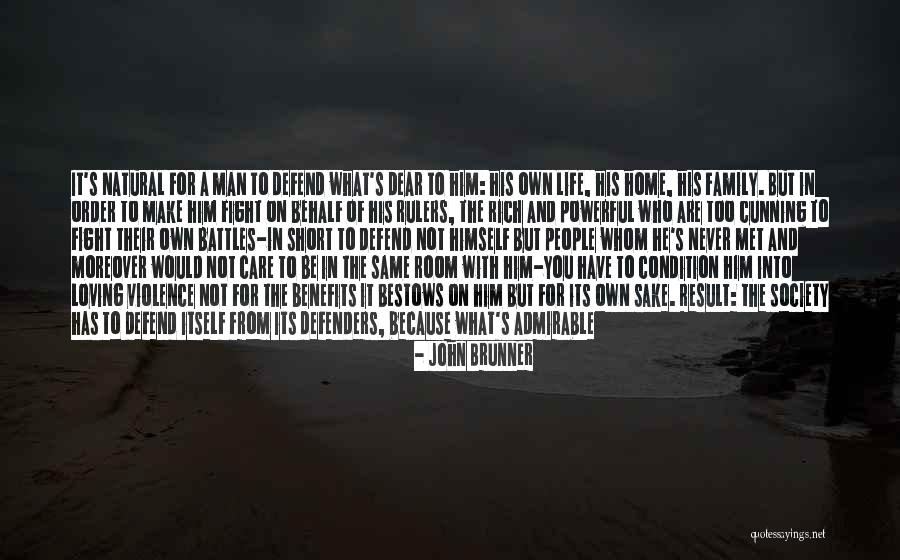
It's natural for a man to defend what's dear to him: his own life, his home, his family. But in order to make him fight on behalf of his rulers, the rich and powerful who are too cunning to fight their own battles-in short to defend not himself but people whom he's never met and moreover would not care to be in the same room with him-you have to condition him into loving violence not for the benefits it bestows on him but for its own sake. Result: the society has to defend itself from its defenders, because what's admirable in wartime is termed psychopathic in peace. It's easier to wreck a man than to repair him. Ask any psychotherapist. And take a look at the crime figures among veterans. — John Brunner
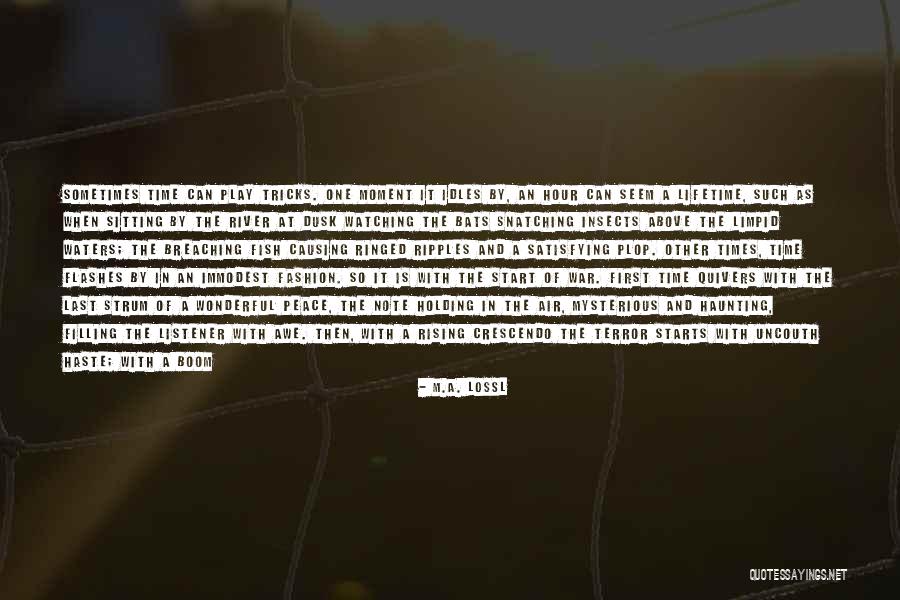
Sometimes time can play tricks. One moment it idles by, an hour can seem a lifetime, such as when sitting by the river at dusk watching the bats snatching insects above the limpid waters; the breaching fish causing ringed ripples and a satisfying plop. Other times, time flashes by in an immodest fashion. So it is with the start of war. First time quivers with the last strum of a wonderful peace, the note holding in the air, mysterious and haunting, filling the listener with awe. Then, with a rising crescendo the terror starts with uncouth haste; with a boom the listener is shaken from their reverie and delivered into the servitude, of an ear-shattering cacophony. — M.A. Lossl
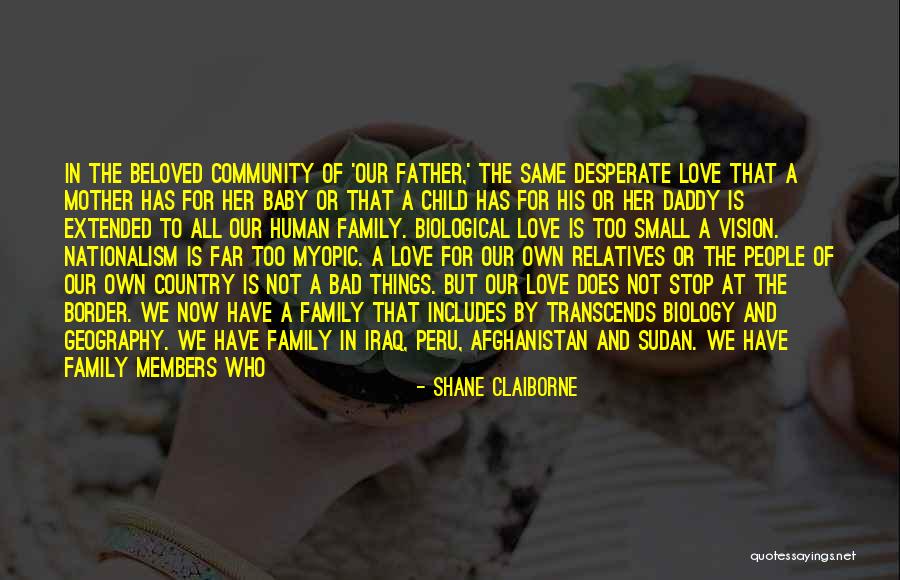
In the beloved community of 'Our Father,' the same desperate love that a mother has for her baby or that a child has for his or her daddy is extended to all our human family. Biological love is too small a vision. Nationalism is far too myopic. A love for our own relatives or the people of our own country is not a bad things. But our love does not stop at the border. We now have a family that includes by transcends biology and geography. We have family in Iraq, Peru, Afghanistan and Sudan. We have family members who are starving and homeless, dying of AIDS and living in the midst of war. This is the new family of our Father. — Shane Claiborne
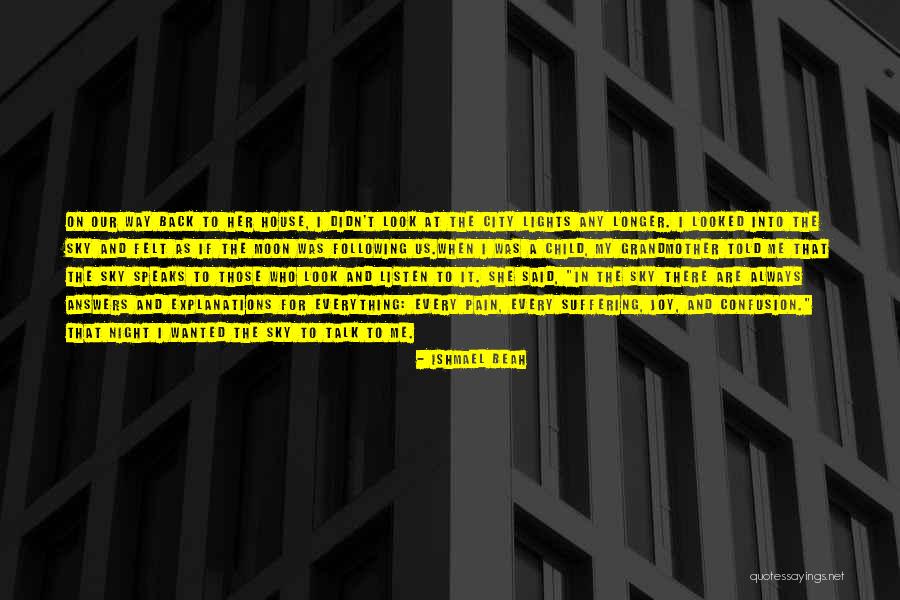
On our way back to her house, I didn't look at the city lights any longer. I looked into the sky and felt as if the moon was following us.
When I was a child, my grandmother told me that the sky speaks to those who look and listen to it. She said, "In the sky there are always answers and explanations for everything: every pain, every suffering, joy, and confusion." That night I wanted the sky to talk to me. — Ishmael Beah
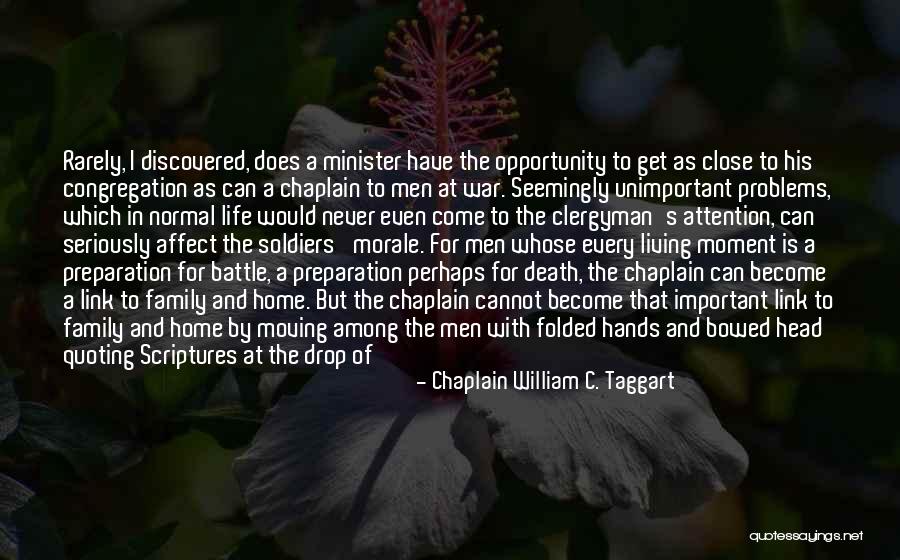
Rarely, I discovered, does a minister have the opportunity to get as close to his congregation as can a chaplain to men at war. Seemingly unimportant problems, which in normal life would never even come to the clergyman's attention, can seriously affect the soldiers' morale. For men whose every living moment is a preparation for battle, a preparation perhaps for death, the chaplain can become a link to family and home. But the chaplain cannot become that important link to family and home by moving among the men with folded hands and bowed head quoting Scriptures at the drop of a hat. He must share with the men their day-today experiences and enter into them fully. Before he can gain the soldiers' confidence in him as a chaplain, he must gain their confidence and respect in him as a man. Visiting the men in their quarters below deck became one of my regular duties. Down below in the hold of the ship was my 'pastorate,' and almost daily I spent as much time there as possible. — Chaplain William C. Taggart
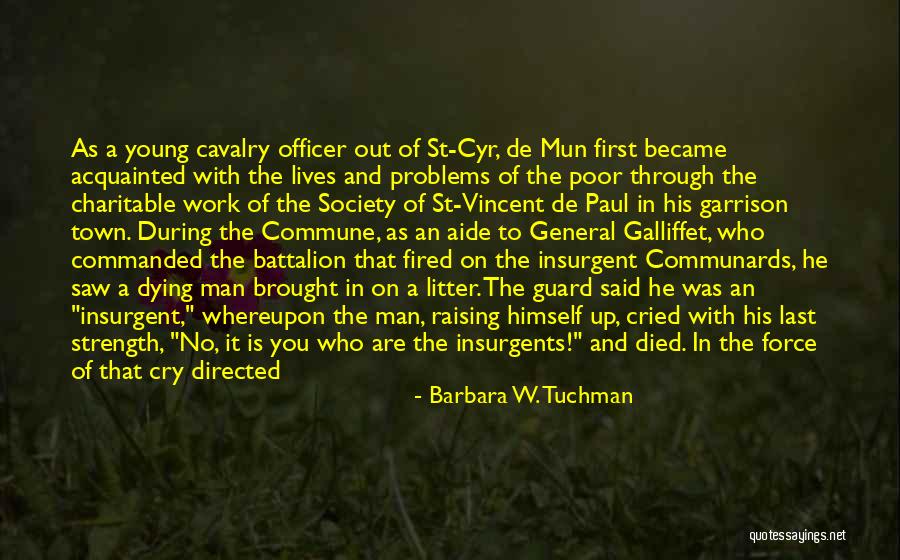
As a young cavalry officer out of St-Cyr, de Mun first became acquainted with the lives and problems of the poor through the charitable work of the Society of St-Vincent de Paul in his garrison town. During the Commune, as an aide to General Galliffet, who commanded the battalion that fired on the insurgent Communards, he saw a dying man brought in on a litter. The guard said he was an "insurgent," whereupon the man, raising himself up, cried with his last strength, "No, it is you who are the insurgents!" and died. In the force of that cry directed at himself, his uniform, his family, his Church, de Mun had recognized the reason for civil war and vowed himself to heal the cleavage. He blamed the Commune on "the apathy of the bourgeois class and the ferocious hatred for society of the working class." The responsible ones, he had been told by one of the St. Vincent brothers, were "you, the rich, the great, the happy ones of life who pass by the people without seeing them." To — Barbara W. Tuchman
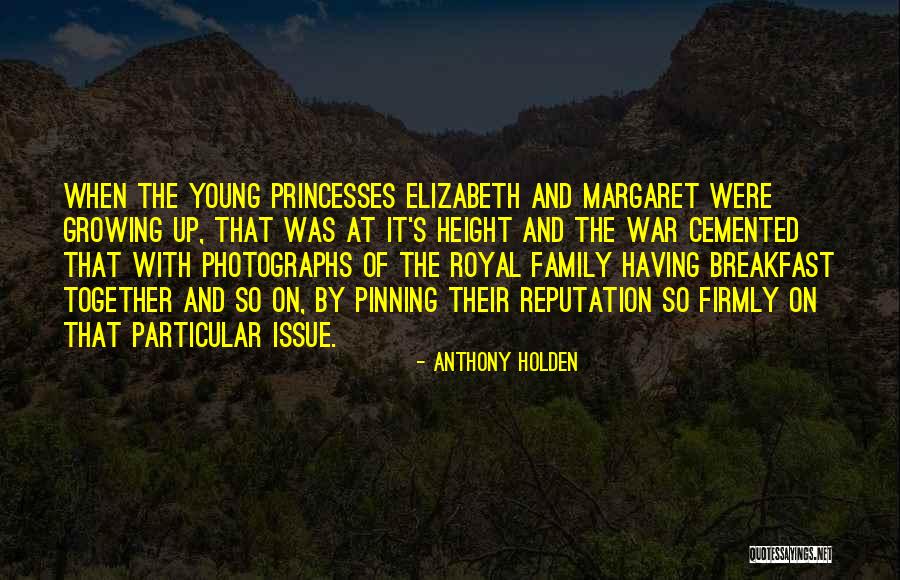
When the young Princesses Elizabeth and Margaret were growing up, that was at it's height and the War cemented that with photographs of the Royal Family having breakfast together and so on, by pinning their reputation so firmly on that particular issue. — Anthony Holden
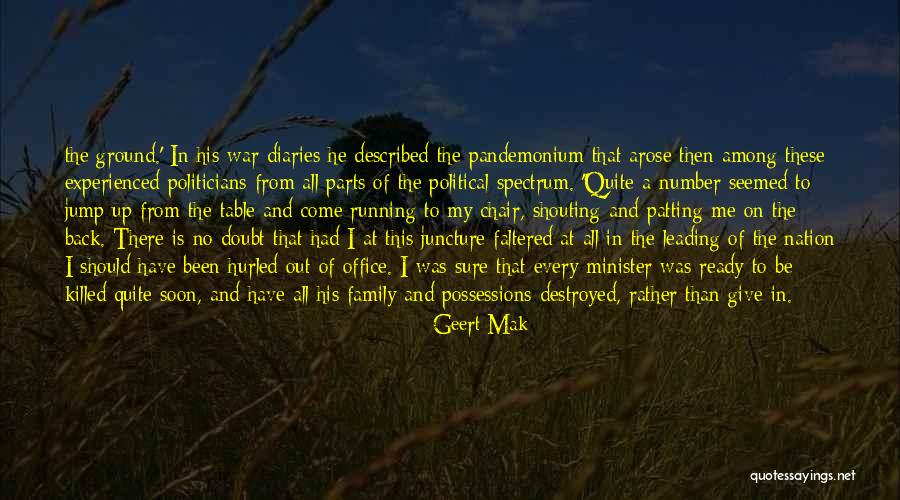
the ground.' In his war diaries he described the pandemonium that arose then among these experienced politicians from all parts of the political spectrum. 'Quite a number seemed to jump up from the table and come running to my chair, shouting and patting me on the back. There is no doubt that had I at this juncture faltered at all in the leading of the nation I should have been hurled out of office. I was sure that every minister was ready to be killed quite soon, and have all his family and possessions destroyed, rather than give in. — Geert Mak
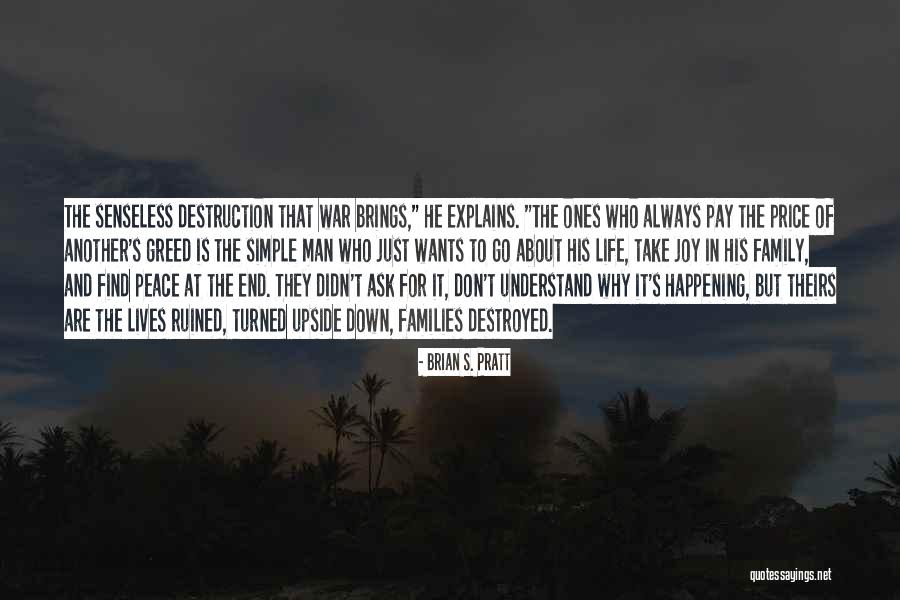
The senseless destruction that war brings," he explains. "The ones who always pay the price of another's greed is the simple man who just wants to go about his life, take joy in his family, and find peace at the end. They didn't ask for it, don't understand why it's happening, but theirs are the lives ruined, turned upside down, families destroyed. — Brian S. Pratt
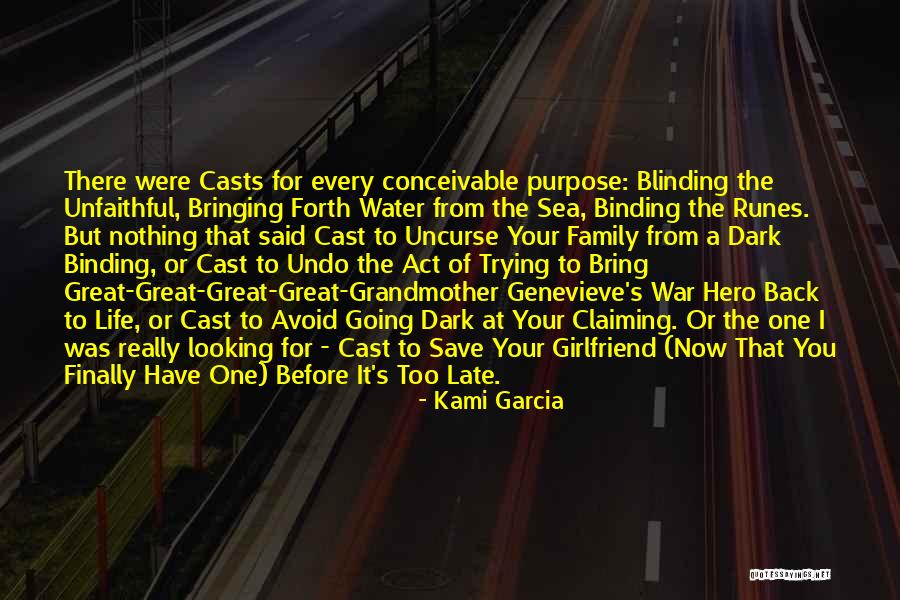
There were Casts for every conceivable purpose: Blinding the Unfaithful, Bringing Forth Water from the Sea, Binding the Runes. But nothing that said Cast to Uncurse Your Family from a Dark Binding, or Cast to Undo the Act of Trying to Bring Great-Great-Great-Great-Grandmother Genevieve's War Hero Back to Life, or Cast to Avoid Going Dark at Your Claiming. Or the one I was really looking for - Cast to Save Your Girlfriend (Now That You Finally Have One) Before It's Too Late. — Kami Garcia
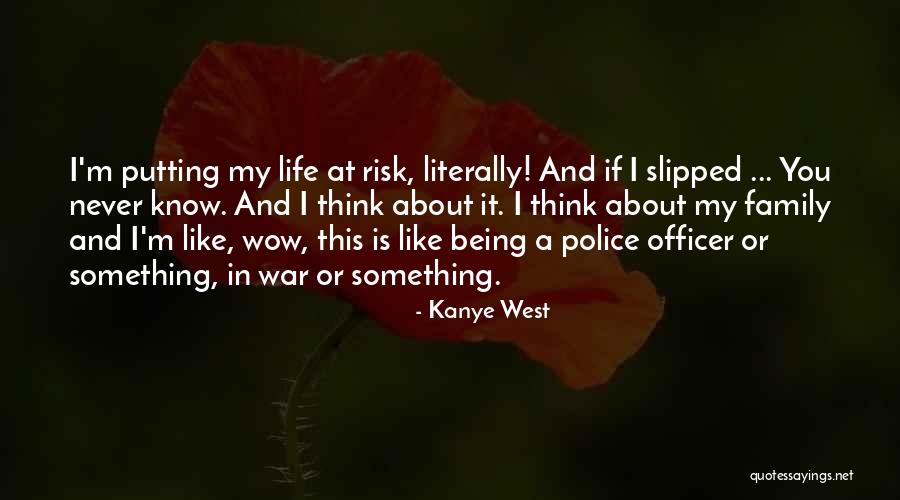
I'm putting my life at risk, literally! And if I slipped ... You never know. And I think about it. I think about my family and I'm like, wow, this is like being a police officer or something, in war or something. — Kanye West
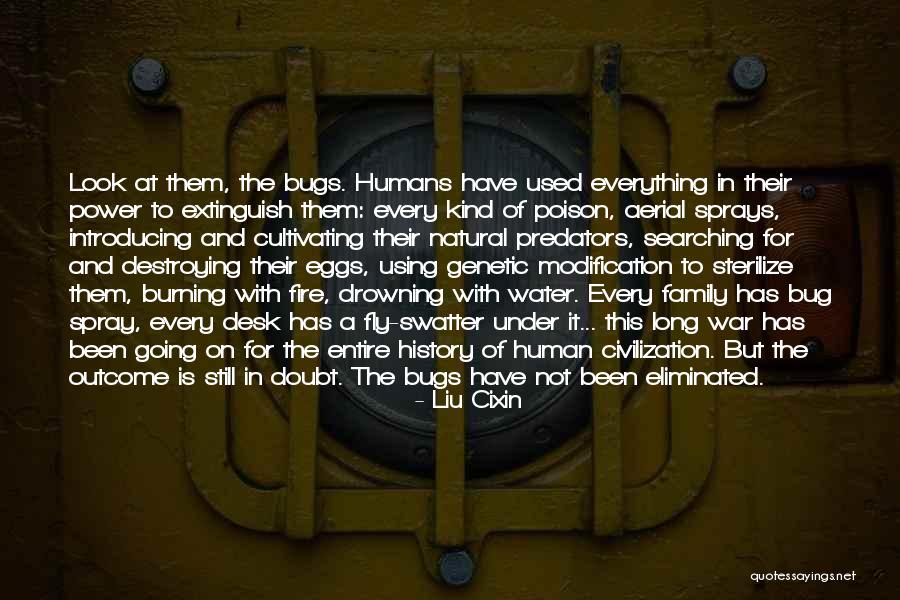
Look at them, the bugs. Humans have used everything in their power to extinguish them: every kind of poison, aerial sprays, introducing and cultivating their natural predators, searching for and destroying their eggs, using genetic modification to sterilize them, burning with fire, drowning with water. Every family has bug spray, every desk has a fly-swatter under it... this long war has been going on for the entire history of human civilization. But the outcome is still in doubt. The bugs have not been eliminated. — Liu Cixin
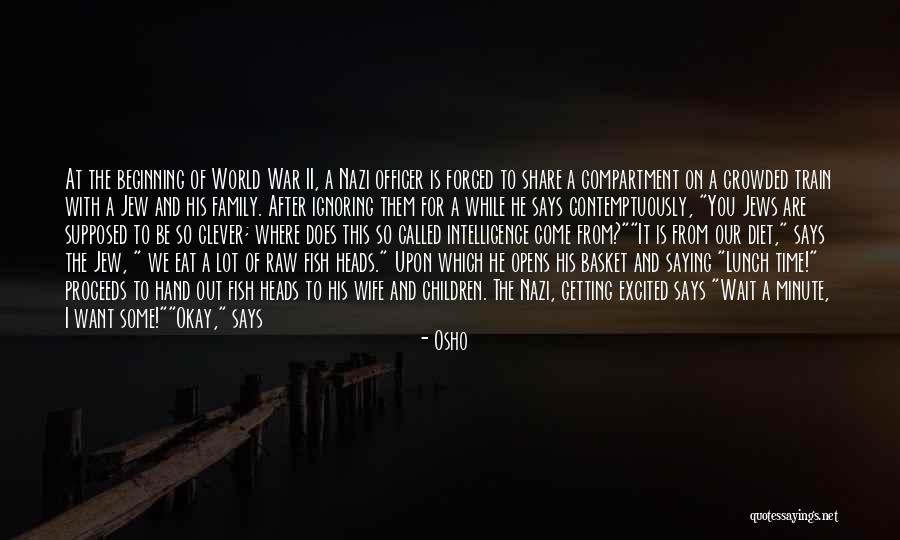
At the beginning of World War II, a Nazi officer is forced to share a compartment on a crowded train with a Jew and his family. After ignoring them for a while he says contemptuously, "You Jews are supposed to be so clever; where does this so called intelligence come from?"
"It is from our diet," says the Jew, " we eat a lot of raw fish heads." Upon which he opens his basket and saying "Lunch time!" proceeds to hand out fish heads to his wife and children. The Nazi, getting excited says "Wait a minute, I want some!"
"Okay," says the Jew "I will sell you six for twenty-five dollars."
The Nazi accepts and begins to chew. He almost throws up, but the children shout encouragment, "Suck out the brains, suck out the brains!" The Nazi is on his fourth head when he says to the Jew, "Is not twenty-five dollars a lot of money to pay for six fish heads, that are usually thrown out as garbage?"
"See," says the Jew, "It's working already! — Osho
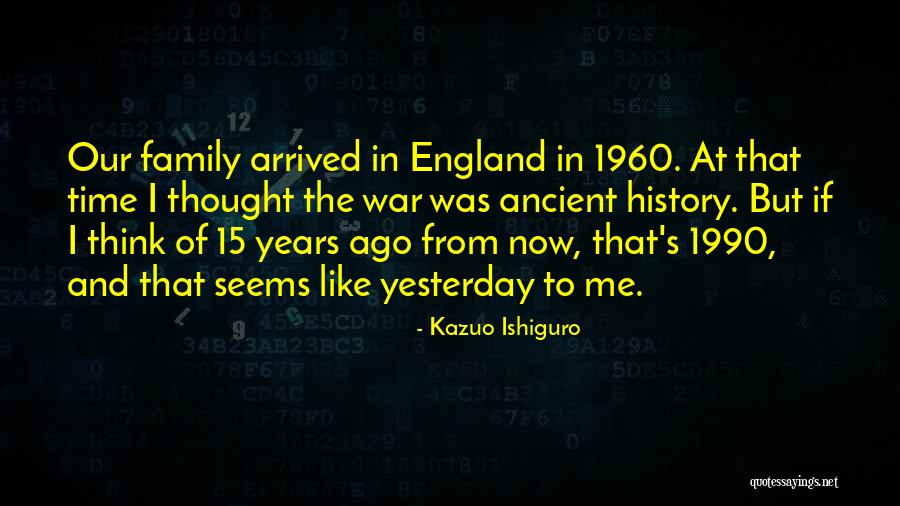
Our family arrived in England in 1960. At that time I thought the war was ancient history. But if I think of 15 years ago from now, that's 1990, and that seems like yesterday to me. — Kazuo Ishiguro
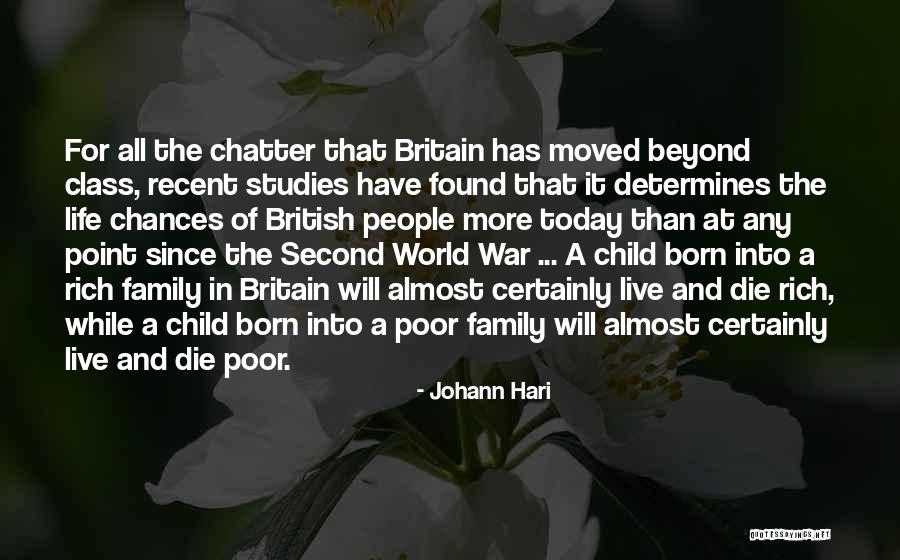
For all the chatter that Britain has moved beyond class, recent studies have found that it determines the life chances of British people more today than at any point since the Second World War ... A child born into a rich family in Britain will almost certainly live and die rich, while a child born into a poor family will almost certainly live and die poor. — Johann Hari
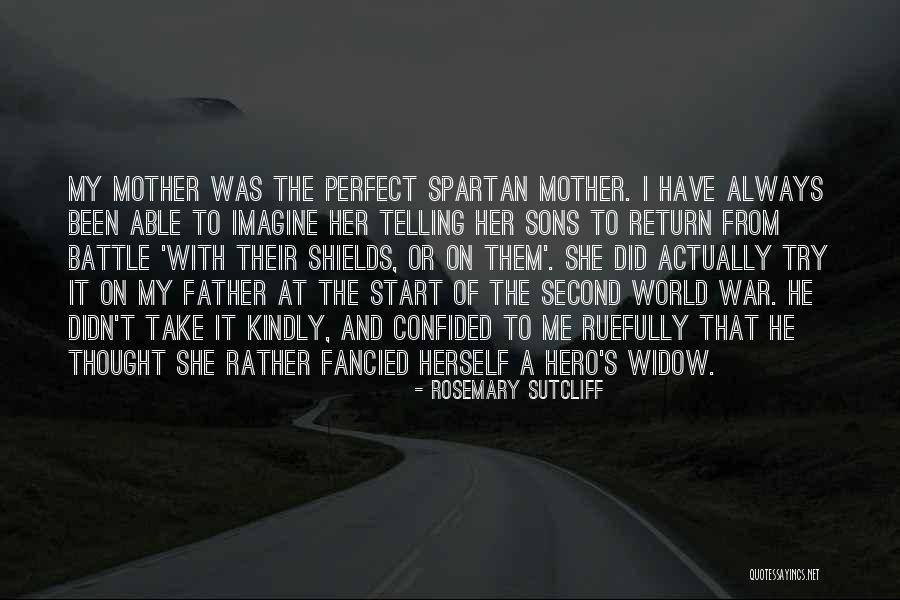
My mother was the perfect Spartan mother. I have always been able to imagine her telling her sons to return from battle 'with their shields, or on them'. She did actually try it on my father at the start of the Second World War. He didn't take it kindly, and confided to me ruefully that he thought she rather fancied herself a Hero's Widow. — Rosemary Sutcliff
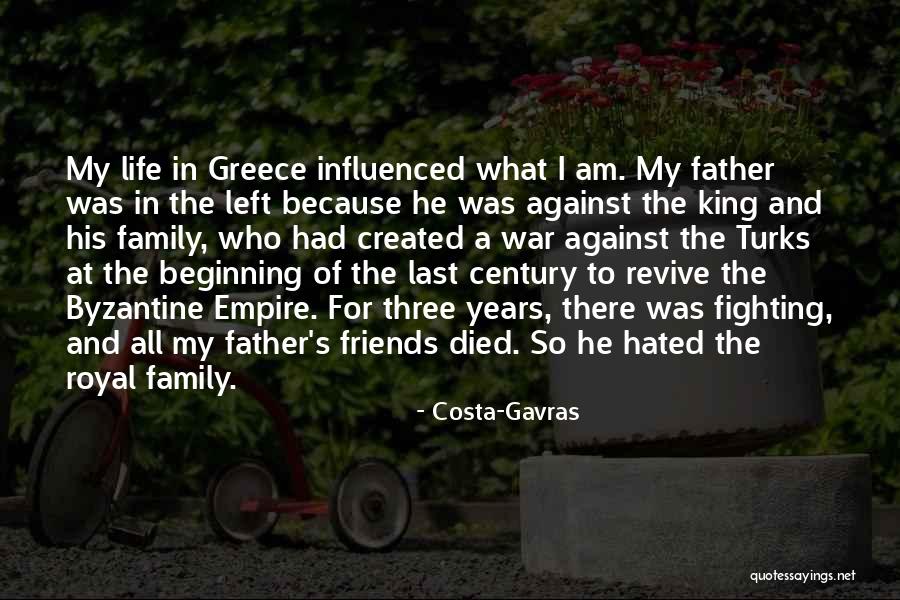
My life in Greece influenced what I am. My father was in the left because he was against the king and his family, who had created a war against the Turks at the beginning of the last century to revive the Byzantine Empire. For three years, there was fighting, and all my father's friends died. So he hated the royal family. — Costa-Gavras
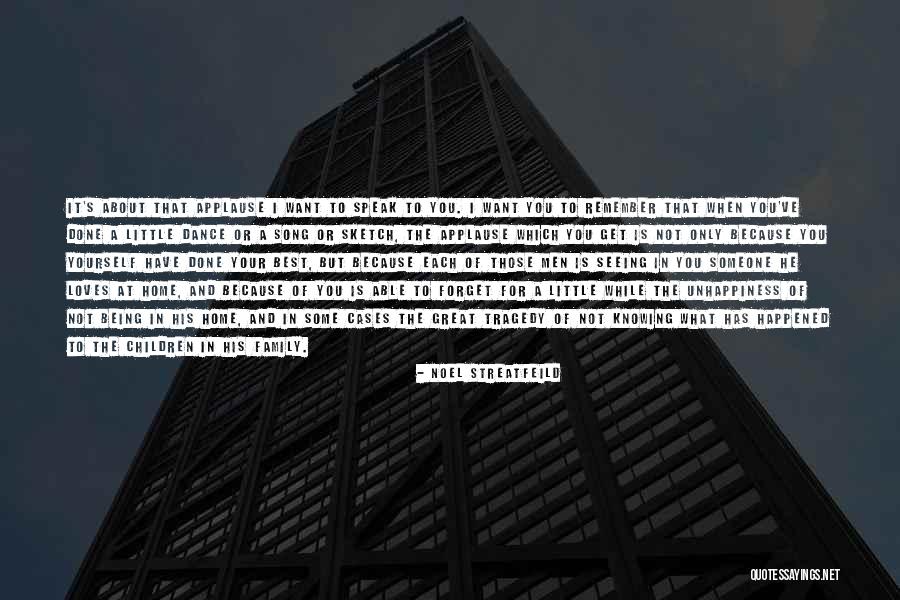
It's about that applause I want to speak to you. I want you to remember that when you've done a little dance or a song or sketch, the applause which you get is not only because you yourself have done your best, but because each of those men is seeing in you someone he loves at home, and because of you is able to forget for a little while the unhappiness of not being in his home, and in some cases the great tragedy of not knowing what has happened to the children in his family. — Noel Streatfeild
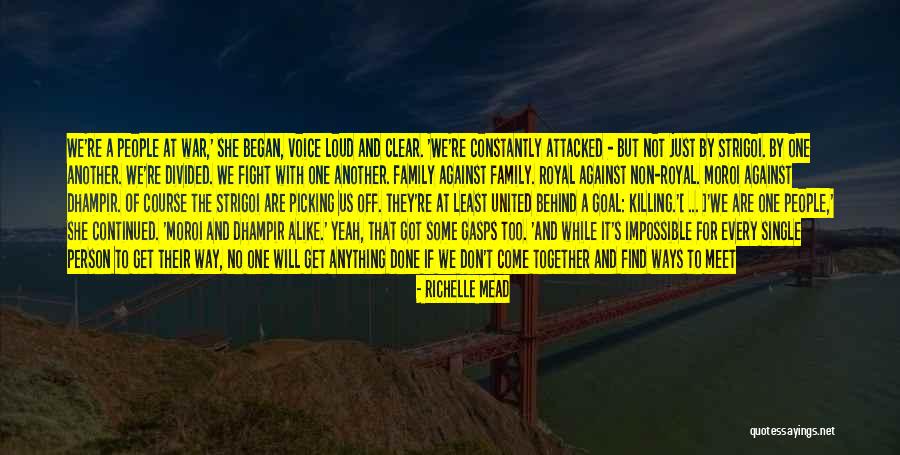
We're a people at war,' she began, voice loud and clear. 'We're constantly attacked - but not just by Strigoi. By one another. We're divided. We fight with one another. Family against family. Royal against non-royal. Moroi against dhampir. Of course the Strigoi are picking us off. They're at least united behind a goal: killing.'
[ ... ]
'We are one people,' she continued. 'Moroi and dhampir alike.' Yeah, that got some gasps too. 'And while it's impossible for every single person to get their way, no one will get anything done if we don't come together and find ways to meet in the middle - even if it means making hard choices.'
[ ... ]
We've kept magic alongside technology. We conduct these sessions with scrolls and - with these.' She smiled and tapped her microphone. 'That's how we have survived. We hold onto our That's how we have survived. That's how we will survive. — Richelle Mead
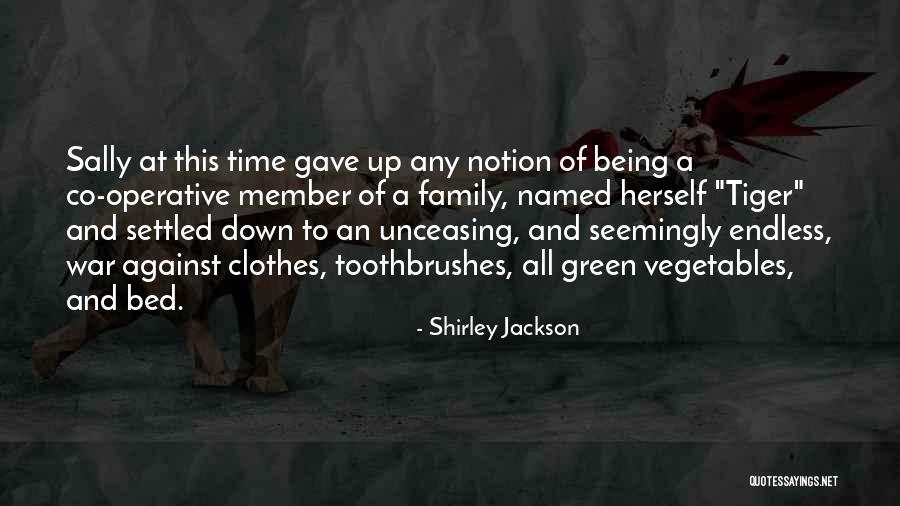
Sally at this time gave up any notion of being a co-operative member of a family, named herself "Tiger" and settled down to an unceasing, and seemingly endless, war against clothes, toothbrushes, all green vegetables, and bed. — Shirley Jackson
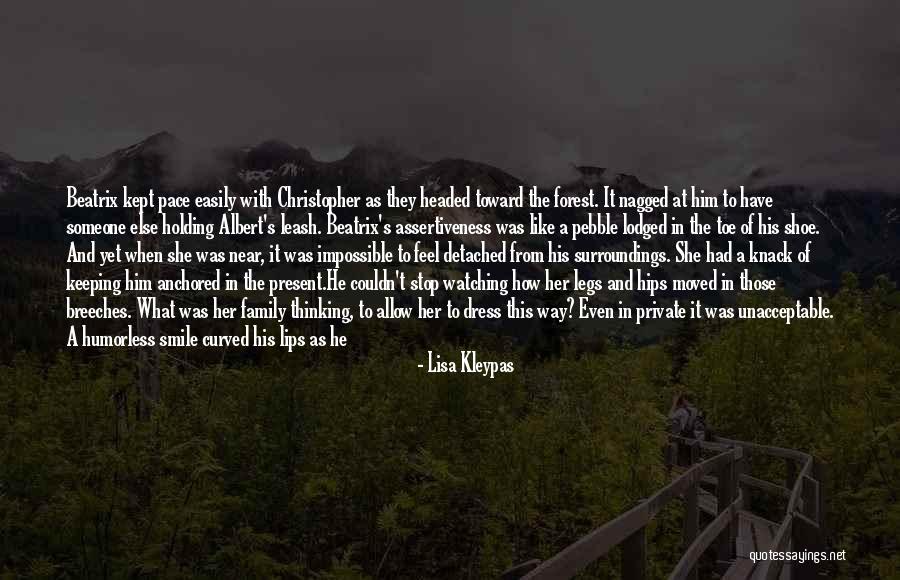
Beatrix kept pace easily with Christopher as they headed toward the forest. It nagged at him to have someone else holding Albert's leash. Beatrix's assertiveness was like a pebble lodged in the toe of his shoe. And yet when she was near, it was impossible to feel detached from his surroundings. She had a knack of keeping him anchored in the present.
He couldn't stop watching how her legs and hips moved in those breeches. What was her family thinking, to allow her to dress this way? Even in private it was unacceptable. A humorless smile curved his lips as he reflected that he had at least one thing in common with Beatrix Hathaway--neither of them was in step with the rest of the world.
The difference was that he wanted to be.
It had been so easy for him, before the war. He had always known the right thing to do or say. Now the prospect of reentering polite society seemed rather like playing a game in which he had forgotten the rules. — Lisa Kleypas
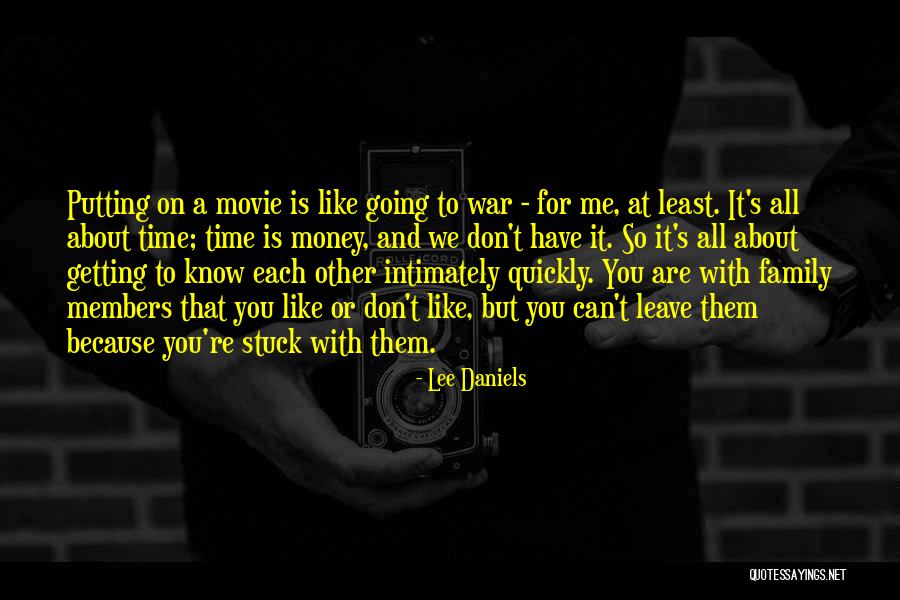
Putting on a movie is like going to war - for me, at least. It's all about time; time is money, and we don't have it. So it's all about getting to know each other intimately quickly. You are with family members that you like or don't like, but you can't leave them because you're stuck with them. — Lee Daniels
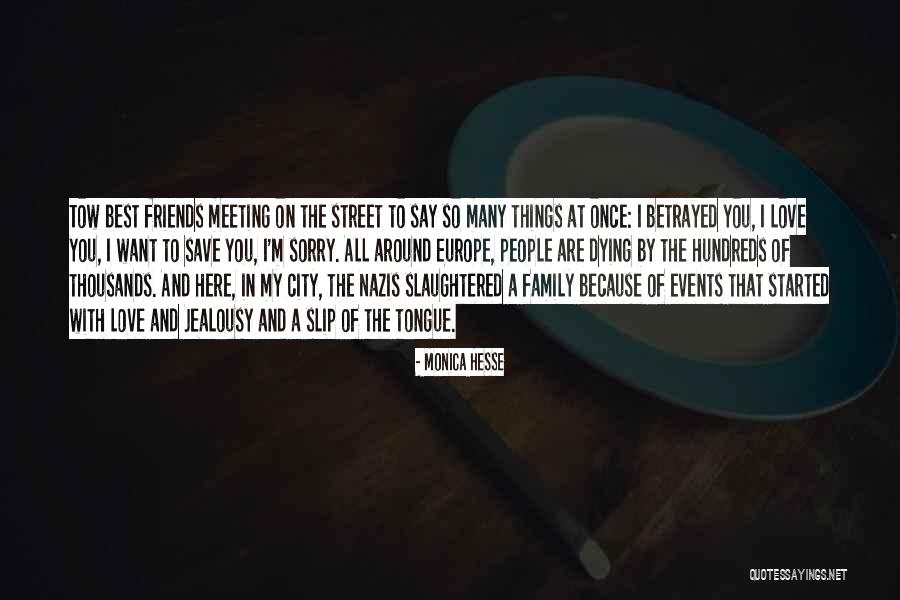
Tow best friends meeting on the street to say so many things at once: I betrayed you, I love you, I want to save you, I'm sorry. All around Europe, people are dying by the hundreds of thousands. And here, in my city, the Nazis slaughtered a family because of events that started with love and jealousy and a slip of the tongue. — Monica Hesse
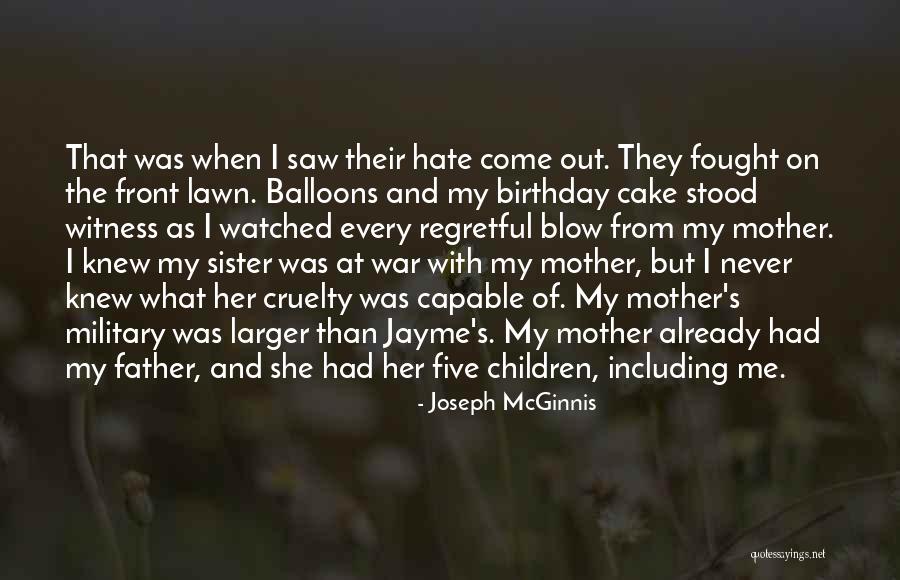
That was when I saw their hate come out. They fought on the front lawn. Balloons and my birthday cake stood witness as I watched every regretful blow from my mother. I knew my sister was at war with my mother, but I never knew what her cruelty was capable of. My mother's military was larger than Jayme's. My mother already had my father, and she had her five children, including me. — Joseph McGinnis
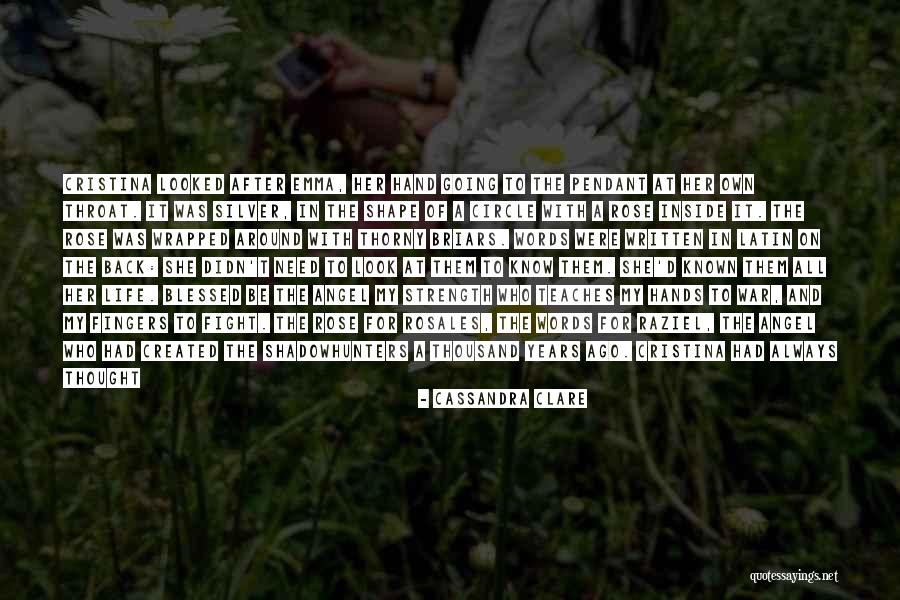
Cristina looked after Emma, her hand going to the pendant at her own throat. It was silver, in the shape of a circle with a rose inside it. The rose was wrapped around with thorny briars. Words were written in Latin on the back: she didn't need to look at them to know them. She'd known them all her life. Blessed be the Angel my strength who teaches my hands to war, and my fingers to fight. The rose for Rosales, the words for Raziel, the Angel who had created the Shadowhunters a thousand years ago. Cristina had always thought Emma fought for her parabatai and for revenge, while she fought for family and faith. But maybe it was all the same thing: maybe it was all love, in the end. — Cassandra Clare
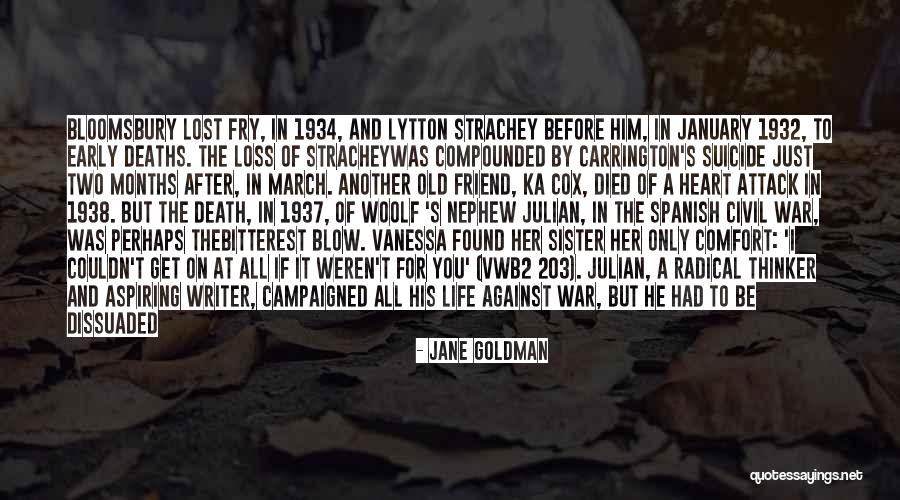
Bloomsbury lost Fry, in 1934, and Lytton Strachey before him, in January 1932, to early deaths. The loss of Strachey
was compounded by Carrington's suicide just two months after, in March. Another old friend, Ka Cox, died of a heart attack in 1938. But the death, in 1937, of Woolf 's nephew Julian, in the Spanish Civil War, was perhaps the
bitterest blow. Vanessa found her sister her only comfort: 'I couldn't get on at all if it weren't for you' (VWB2 203). Julian, a radical thinker and aspiring writer, campaigned all his life against war, but he had to be dissuaded by his
family from joining the International Brigade to fight Franco. Instead he worked as an ambulance driver, a role that did not prevent his death from shrapnel wounds. Woolf 's Three Guineas, she wrote to his mother, was
written 'as an argument with him — Jane Goldman
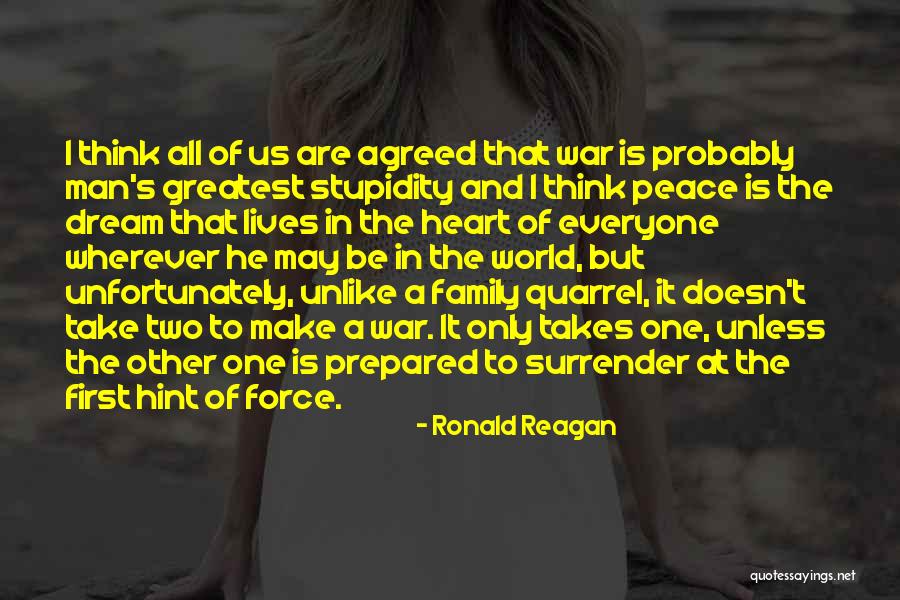
I think all of us are agreed that war is probably man's greatest stupidity and I think peace is the dream that lives in the heart of everyone wherever he may be in the world, but unfortunately, unlike a family quarrel, it doesn't take two to make a war. It only takes one, unless the other one is prepared to surrender at the first hint of force. — Ronald Reagan
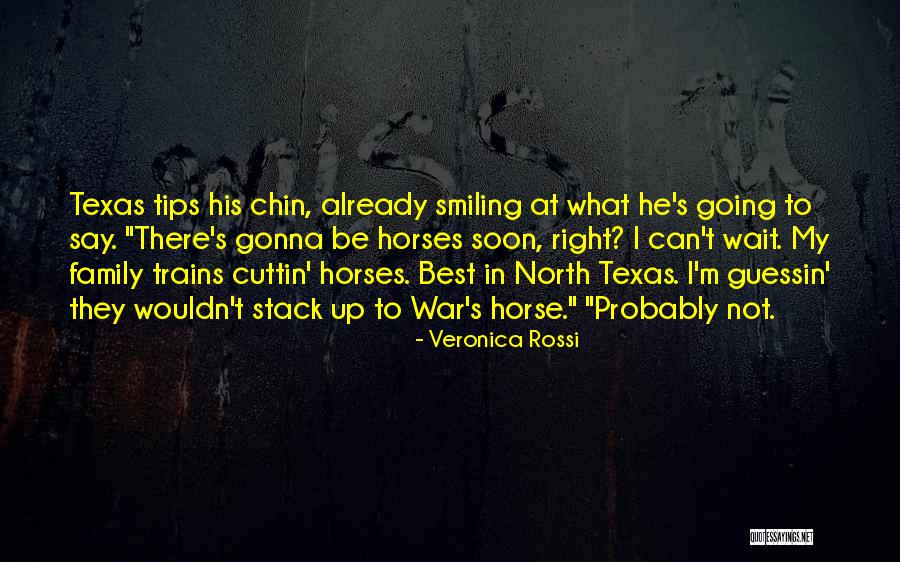
Texas tips his chin, already smiling at what he's going to say. "There's gonna be horses soon, right? I can't wait. My family trains cuttin' horses. Best in North Texas. I'm guessin' they wouldn't stack up to War's horse." "Probably not. — Veronica Rossi
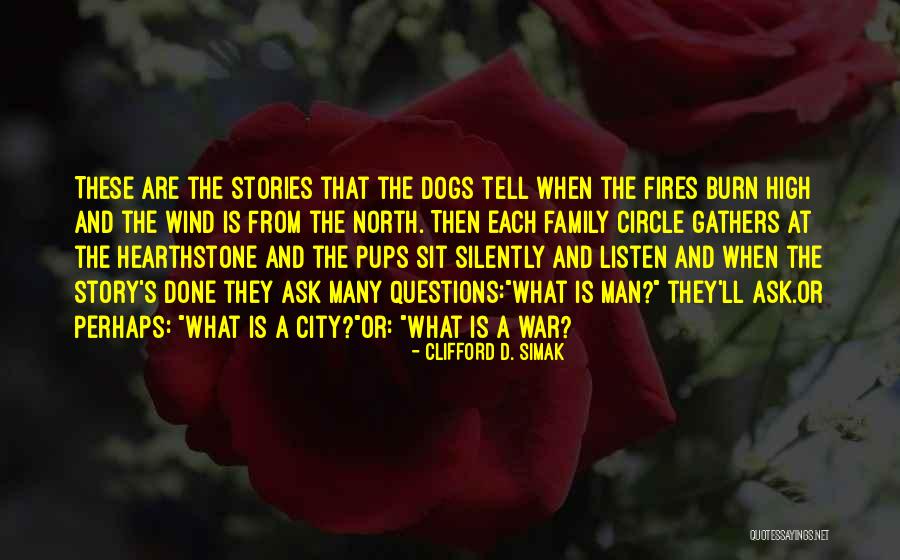
These are the stories that the Dogs tell when the fires burn high and the wind is from the north. Then each family circle gathers at the hearthstone and the pups sit silently and listen and when the story's done they ask many questions:
"What is Man?" they'll ask.
Or perhaps: "What is a city?"
Or: "What is a war? — Clifford D. Simak
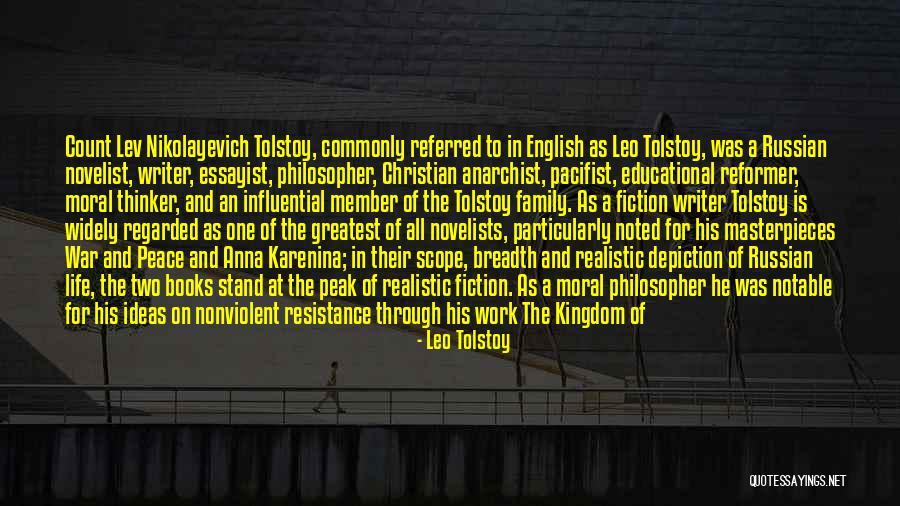
Count Lev Nikolayevich Tolstoy, commonly referred to in English as Leo Tolstoy, was a Russian novelist, writer, essayist, philosopher, Christian anarchist, pacifist, educational reformer, moral thinker, and an influential member of the Tolstoy family. As a fiction writer Tolstoy is widely regarded as one of the greatest of all novelists, particularly noted for his masterpieces War and Peace and Anna Karenina; in their scope, breadth and realistic depiction of Russian life, the two books stand at the peak of realistic fiction. As a moral philosopher he was notable for his ideas on nonviolent resistance through his work The Kingdom of God is Within You, which in turn influenced such twentieth-century figures as Mohandas K. Gandhi and Martin Luther King, Jr. Source: Wikipedia — Leo Tolstoy
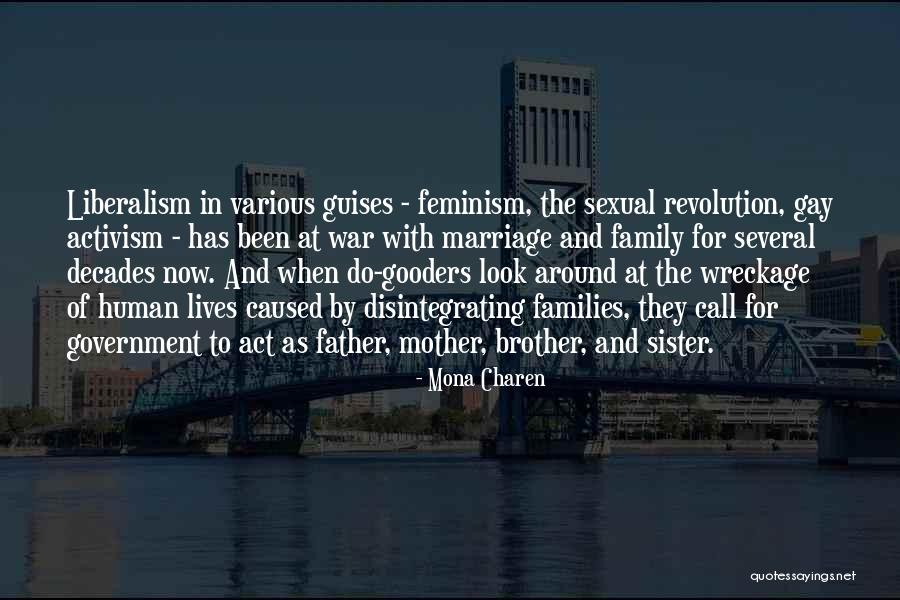
Liberalism in various guises - feminism, the sexual revolution, gay activism - has been at war with marriage and family for several decades now. And when do-gooders look around at the wreckage of human lives caused by disintegrating families, they call for government to act as father, mother, brother, and sister. — Mona Charen
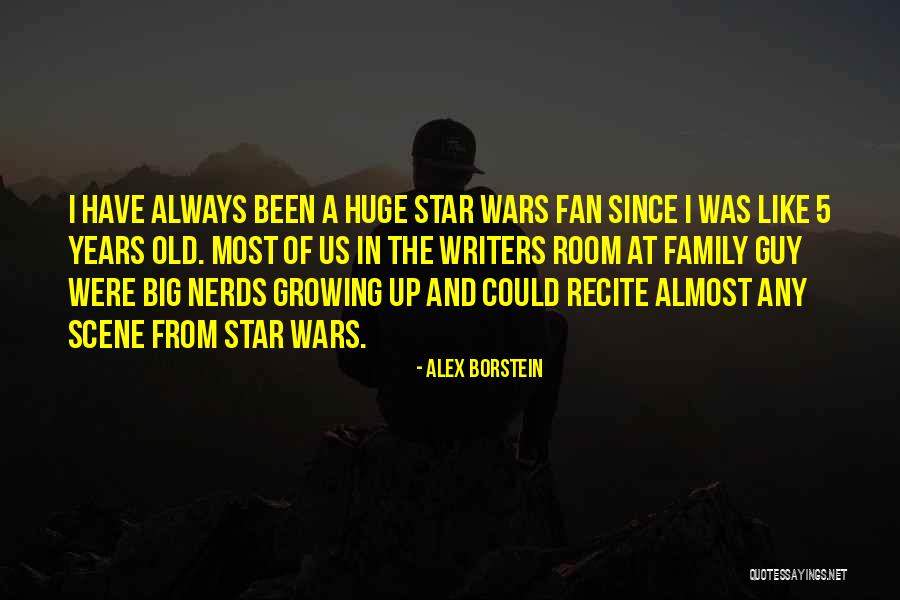
I have always been a HUGE Star Wars fan since I was like 5 years old. Most of us in the writers room at Family Guy were big nerds growing up and could recite almost any scene from Star Wars. — Alex Borstein
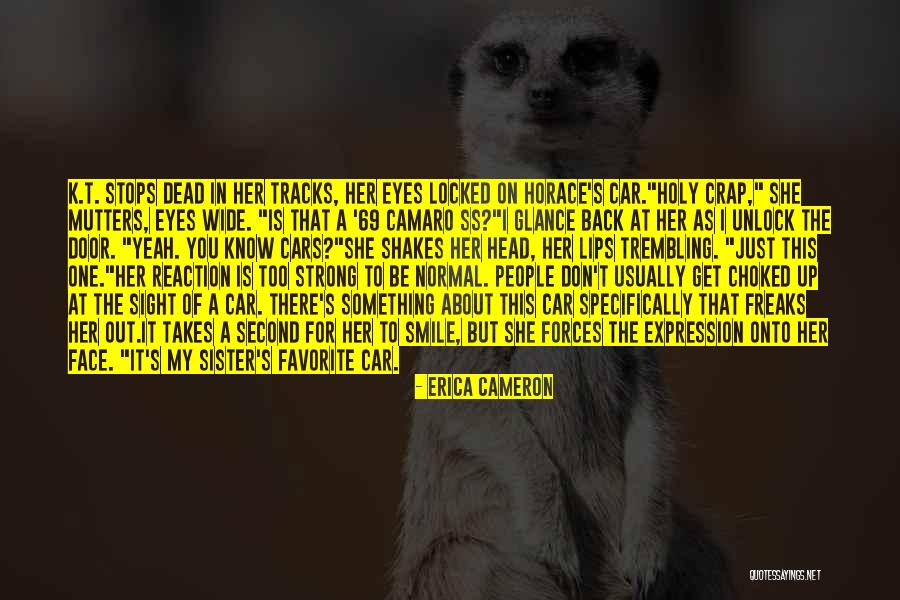
K.T. stops dead in her tracks, her eyes locked on Horace's car.
"Holy crap," she mutters, eyes wide. "Is that a '69 Camaro SS?"
I glance back at her as I unlock the door. "Yeah. You know cars?"
She shakes her head, her lips trembling. "Just this one."
Her reaction is too strong to be normal. People don't usually get choked up at the sight of a car. There's something about this car specifically that freaks her out.
It takes a second for her to smile, but she forces the expression onto her face. "It's my sister's favorite car. — Erica Cameron
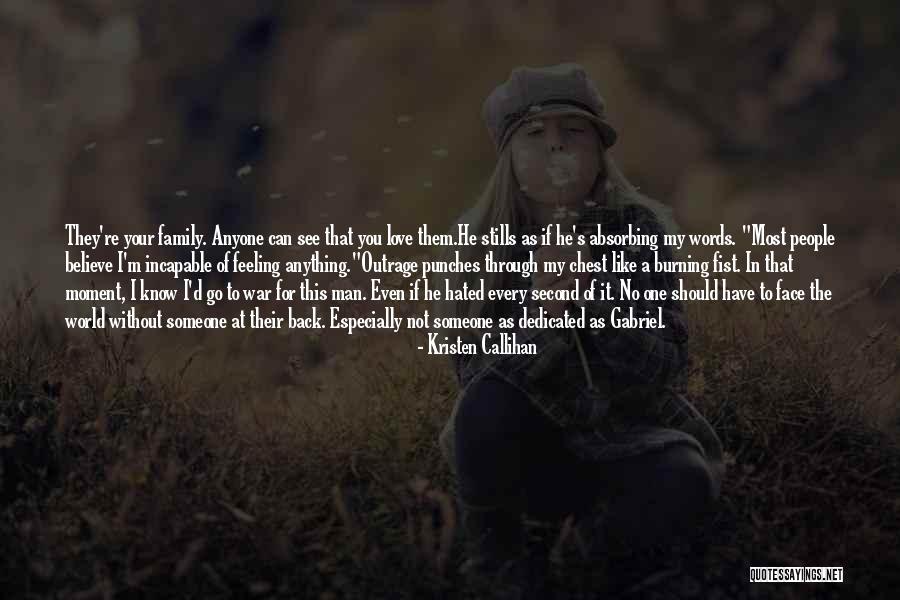
They're your family. Anyone can see that you love them.
He stills as if he's absorbing my words. "Most people believe I'm incapable of feeling anything."
Outrage punches through my chest like a burning fist. In that moment, I know I'd go to war for this man. Even if he hated every second of it. No one should have to face the world without someone at their back. Especially not someone as dedicated as Gabriel. — Kristen Callihan
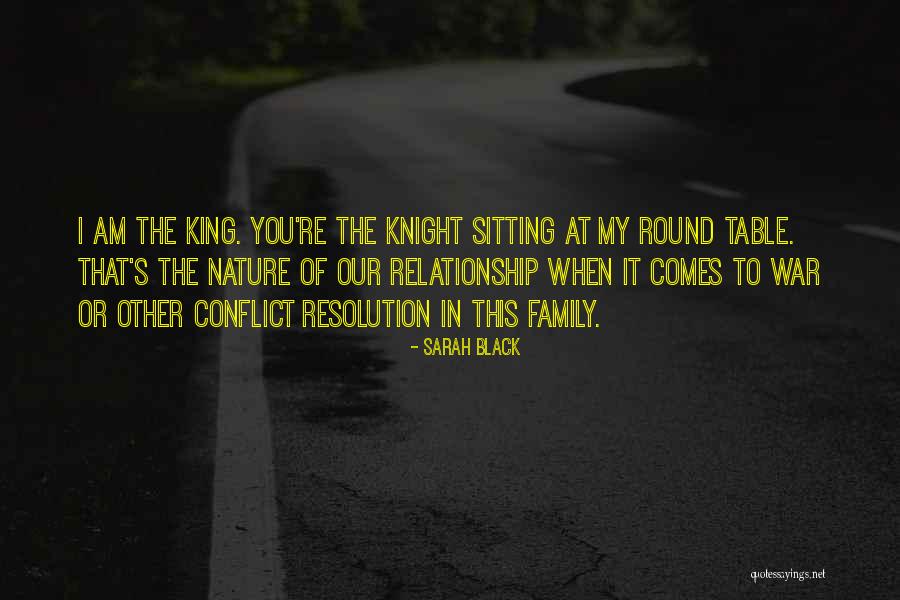
I am the king. You're the knight sitting at my round table. That's the nature of our relationship when it comes to war or other conflict resolution in this family. — Sarah Black
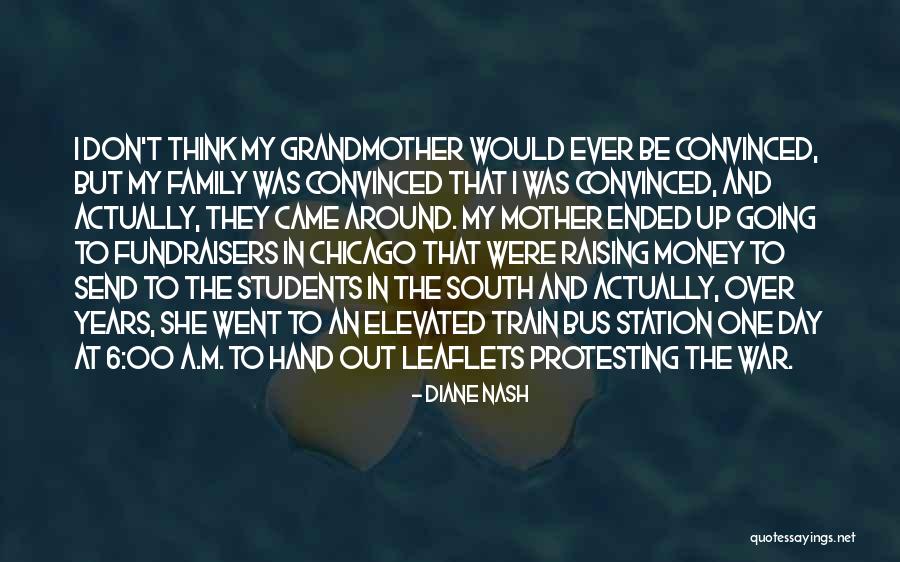
I don't think my grandmother would ever be convinced, but my family was convinced that I was convinced, and actually, they came around. My mother ended up going to fundraisers in Chicago that were raising money to send to the students in the South and actually, over years, she went to an elevated train bus station one day at 6:00 a.m. to hand out leaflets protesting the war. — Diane Nash
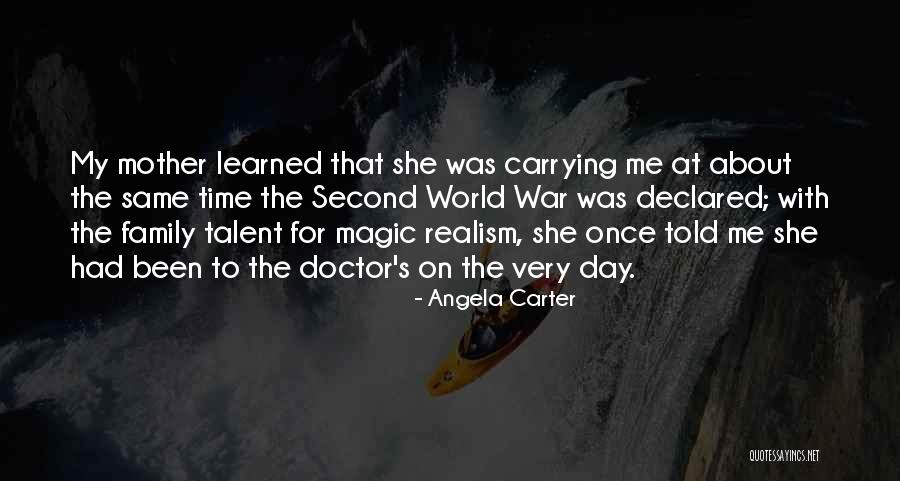
My mother learned that she was carrying me at about the same time the Second World War was declared; with the family talent for magic realism, she once told me she had been to the doctor's on the very day. — Angela Carter
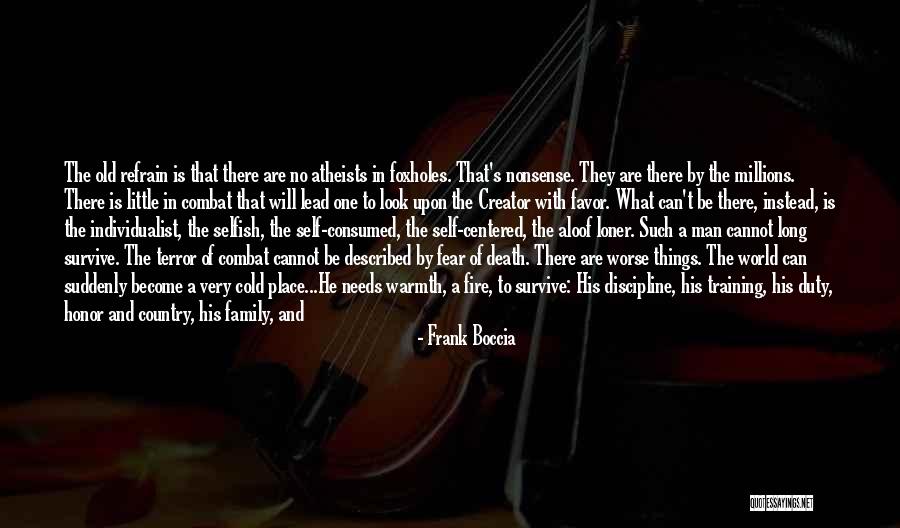
The old refrain is that there are no atheists in foxholes. That's nonsense. They are there by the millions. There is little in combat that will lead one to look upon the Creator with favor. What can't be there, instead, is the individualist, the selfish, the self-consumed, the self-centered, the aloof loner. Such a man cannot long survive. The terror of combat cannot be described by fear of death. There are worse things. The world can suddenly become a very cold place...He needs warmth, a fire, to survive: His discipline, his training, his duty, honor and country, his family, and ultimately the very oak of his manhood are thrown into the blaze, but they are not enough to save him. At the end, he needs the warmth of his comrades. Otherwise, all he will have with which to face the cold dark will be his own spent soul. — Frank Boccia
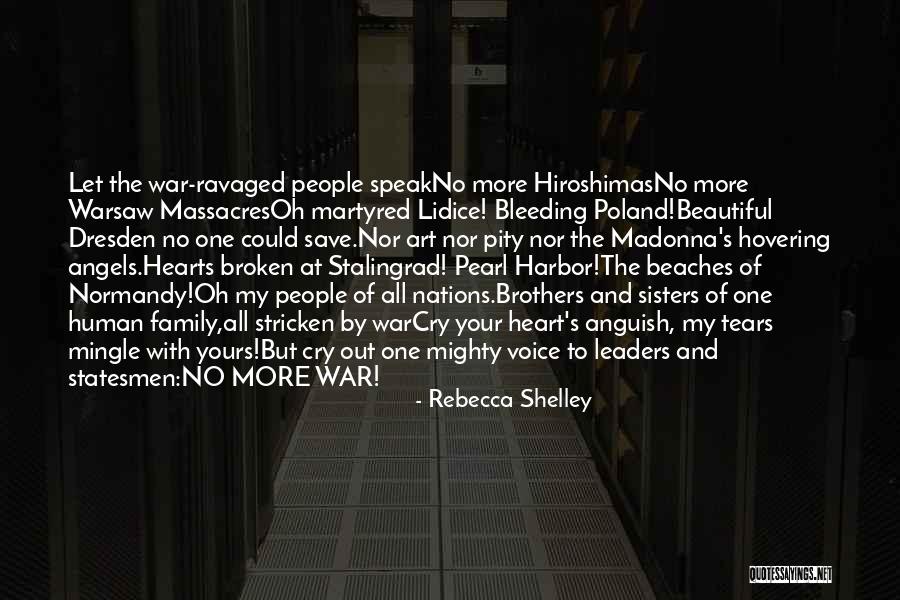
Let the war-ravaged people speak
No more Hiroshimas
No more Warsaw Massacres
Oh martyred Lidice! Bleeding Poland!
Beautiful Dresden no one could save.
Nor art nor pity nor the Madonna's hovering angels.
Hearts broken at Stalingrad! Pearl Harbor!
The beaches of Normandy!
Oh my people of all nations.
Brothers and sisters of one human family,
all stricken by war
Cry your heart's anguish, my tears mingle with yours!
But cry out one mighty voice to leaders and statesmen:
NO MORE WAR! — Rebecca Shelley
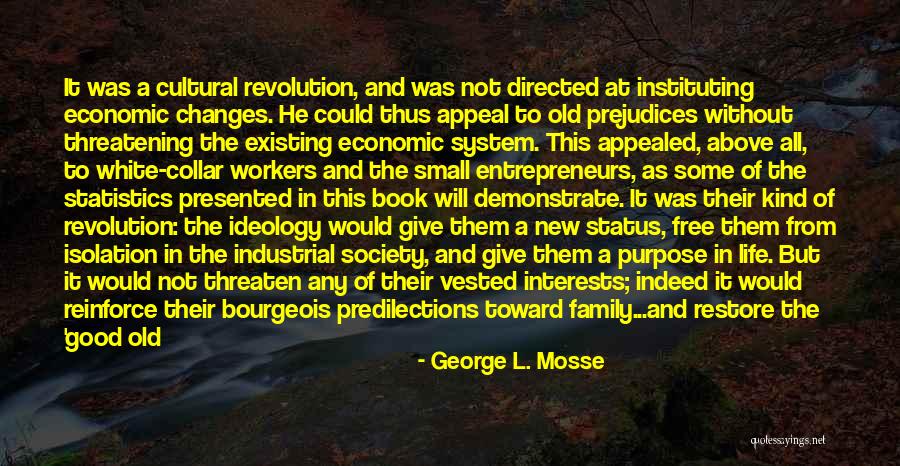
It was a cultural revolution, and was not directed at instituting economic changes. He could thus appeal to old prejudices without threatening the existing economic system. This appealed, above all, to white-collar workers and the small entrepreneurs, as some of the statistics presented in this book will demonstrate. It was their kind of revolution: the ideology would give them a new status, free them from isolation in the industrial society, and give them a purpose in life. But it would not threaten any of their vested interests; indeed it would reinforce their bourgeois predilections toward family...and restore the 'good old values' which had been so sadly dismantled by modernity. — George L. Mosse
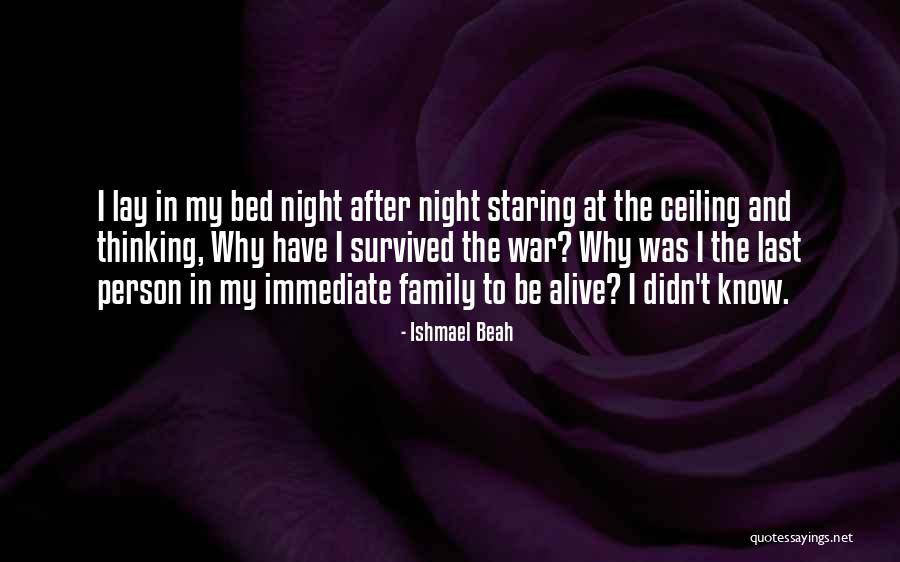
I lay in my bed night after night staring at the ceiling and thinking, Why have I survived the war? Why was I the last person in my immediate family to be alive? I didn't know. — Ishmael Beah
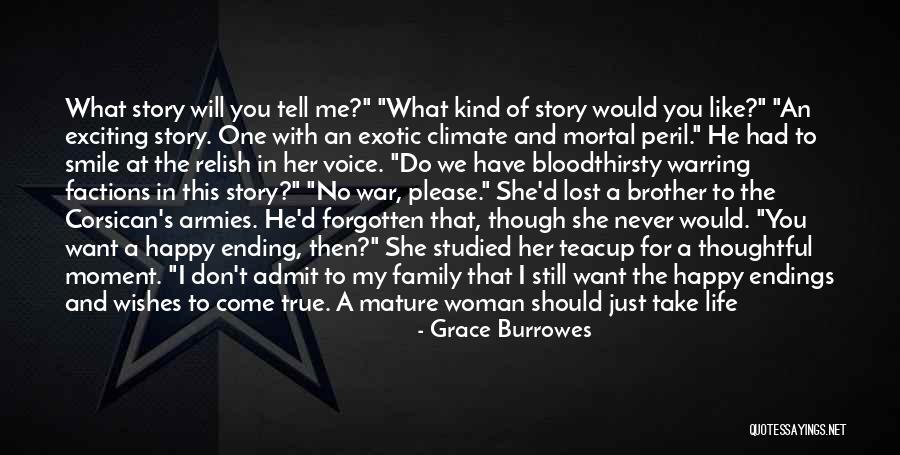
What story will you tell me?" "What kind of story would you like?" "An exciting story. One with an exotic climate and mortal peril." He had to smile at the relish in her voice. "Do we have bloodthirsty warring factions in this story?" "No war, please." She'd lost a brother to the Corsican's armies. He'd forgotten that, though she never would. "You want a happy ending, then?" She studied her teacup for a thoughtful moment. "I don't admit to my family that I still want the happy endings and wishes to come true. A mature woman should just take life as it comes, and I do have a great deal to be grateful for." "But a mature woman should also be honest with herself, and with me. You're allowed to wish for the happy endings, Sophie. For yourself and for Kit too." When — Grace Burrowes
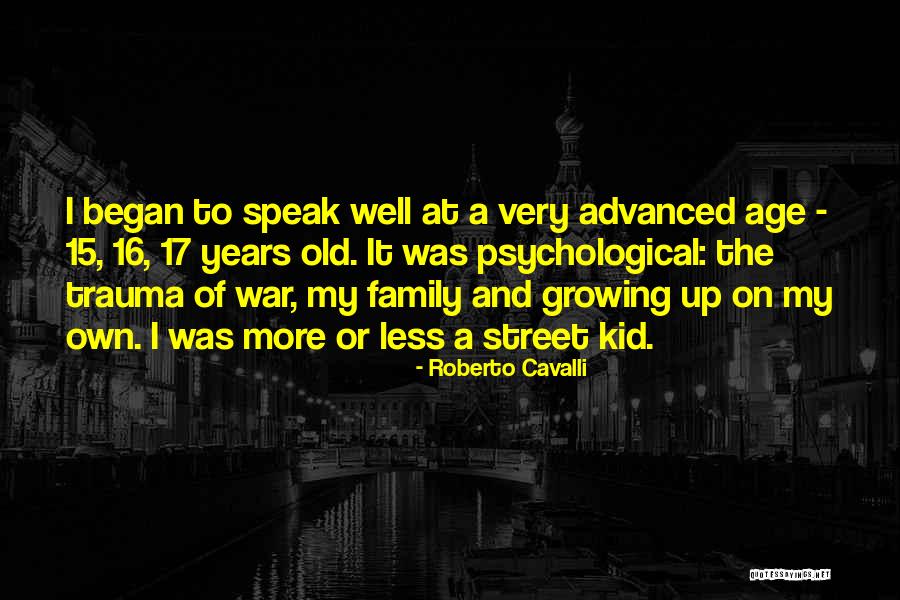
I began to speak well at a very advanced age - 15, 16, 17 years old. It was psychological: the trauma of war, my family and growing up on my own. I was more or less a street kid. — Roberto Cavalli
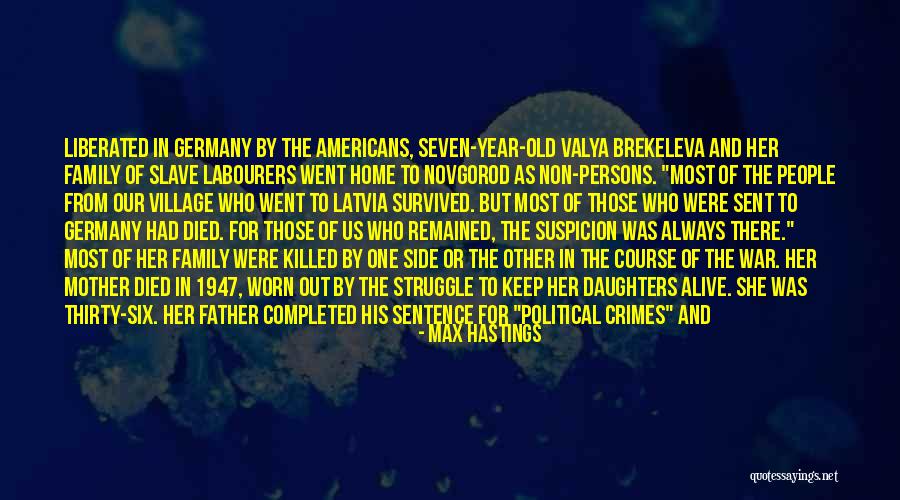
Liberated in Germany by the Americans, seven-year-old Valya Brekeleva and her family of slave labourers went home to Novgorod as non-persons. "Most of the people from our village who went to Latvia survived. But most of those who were sent to Germany had died. For those of us who remained, the suspicion was always there." Most of her family were killed by one side or the other in the course of the war. Her mother died in 1947, worn out by the struggle to keep her daughters alive. She was thirty-six. Her father completed his sentence for "political crimes" and came home from the Urals in 1951, an old man. Even after Valya had completed university and applied for work at a Kazan shipbuilders in the 1960s, when the manager saw that her papers showed her to be an ex-Nazi prisoner he said grimly: "Before we consider anything else, we have got to establish whether you have done damage to the state. — Max Hastings
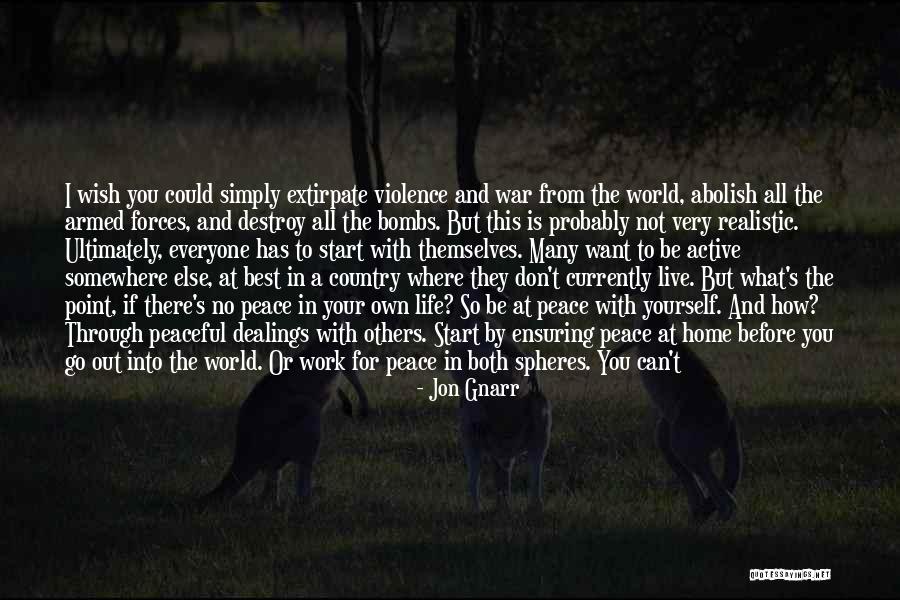
I wish you could simply extirpate violence and war from the world, abolish all the armed forces, and destroy all the bombs. But this is probably not very realistic. Ultimately, everyone has to start with themselves. Many want to be active somewhere else, at best in a country where they don't currently live. But what's the point, if there's no peace in your own life? So be at peace with yourself. And how? Through peaceful dealings with others. Start by ensuring peace at home before you go out into the world. Or work for peace in both spheres. You can't be working for a peace camp in the Middle East during the day and then in the evening have a quarrel with your family over the phone. — Jon Gnarr
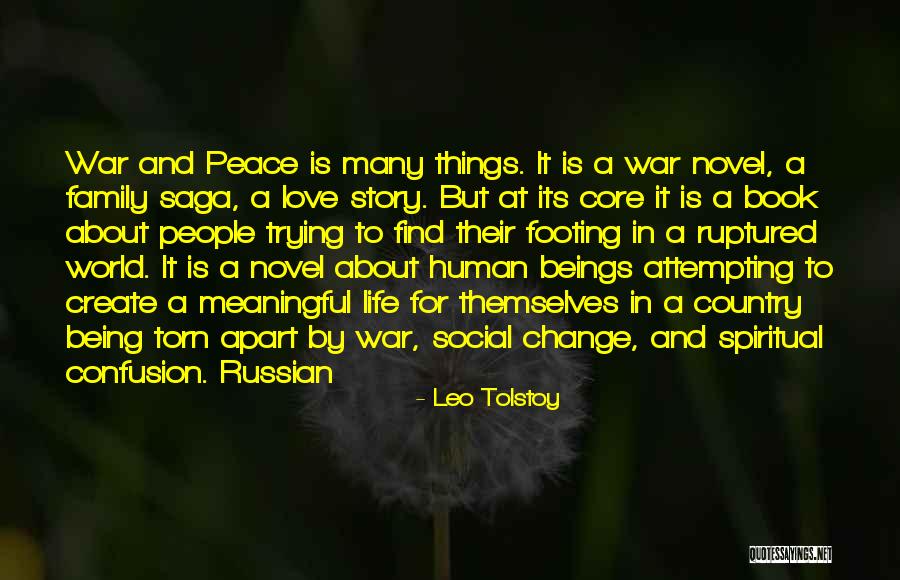
War and Peace is many things. It is a war novel, a family saga, a love story. But at its core it is a book about people trying to find their footing in a ruptured world. It is a novel about human beings attempting to create a meaningful life for themselves in a country being torn apart by war, social change, and spiritual confusion. Russian — Leo Tolstoy
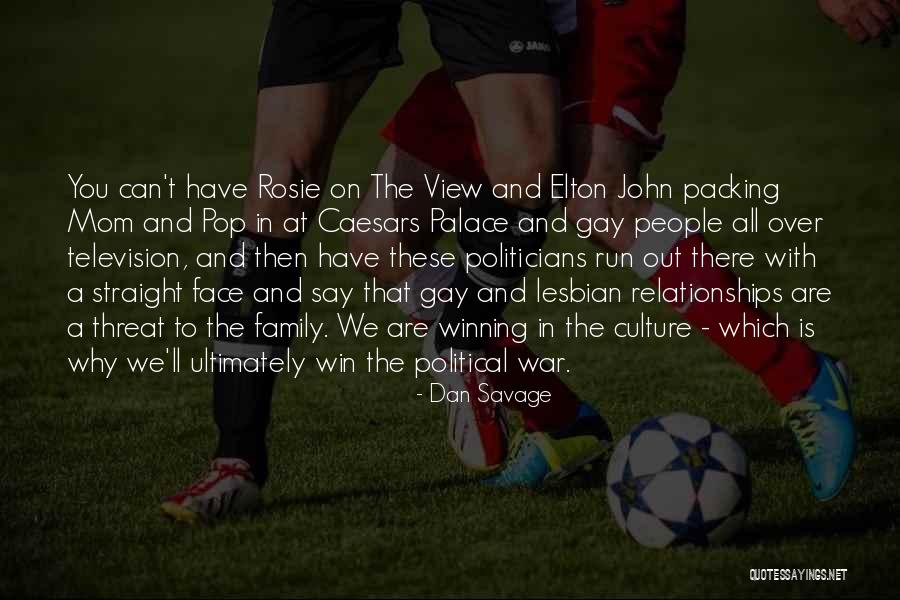
You can't have Rosie on The View and Elton John packing Mom and Pop in at Caesars Palace and gay people all over television, and then have these politicians run out there with a straight face and say that gay and lesbian relationships are a threat to the family. We are winning in the culture - which is why we'll ultimately win the political war. — Dan Savage
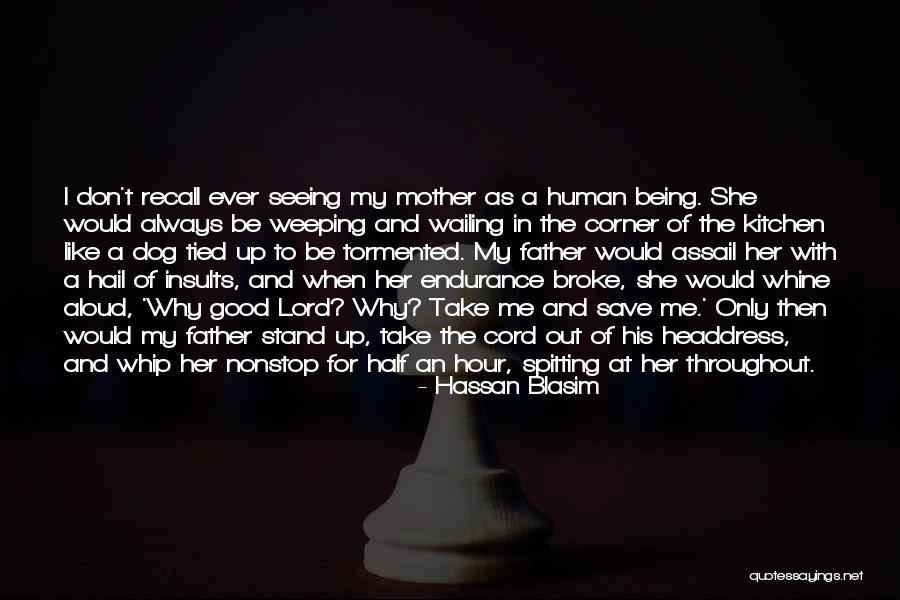
I don't recall ever seeing my mother as a human being. She would always be weeping and wailing in the corner of the kitchen like a dog tied up to be tormented. My father would assail her with a hail of insults, and when her endurance broke, she would whine aloud, 'Why good Lord? Why? Take me and save me.' Only then would my father stand up, take the cord out of his headdress, and whip her nonstop for half an hour, spitting at her throughout. — Hassan Blasim
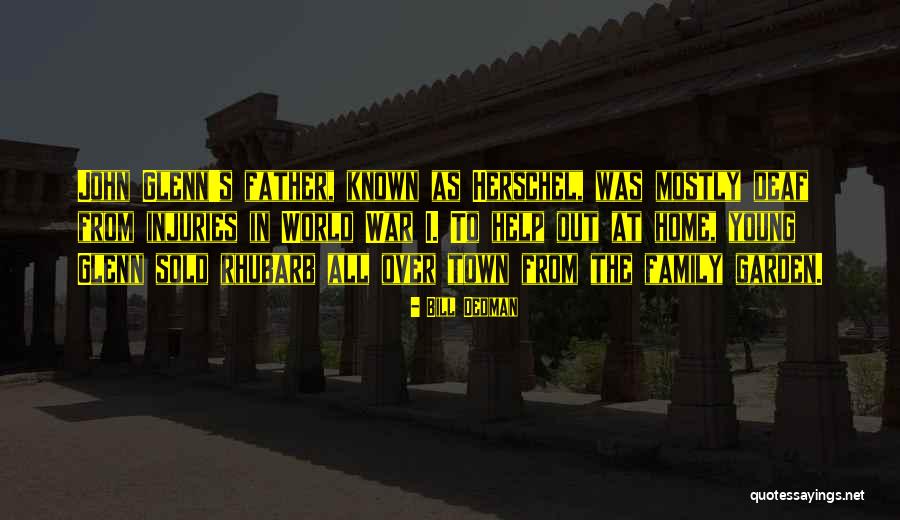
John Glenn's father, known as Herschel, was mostly deaf from injuries in World War I. To help out at home, young Glenn sold rhubarb all over town from the family garden. — Bill Dedman





